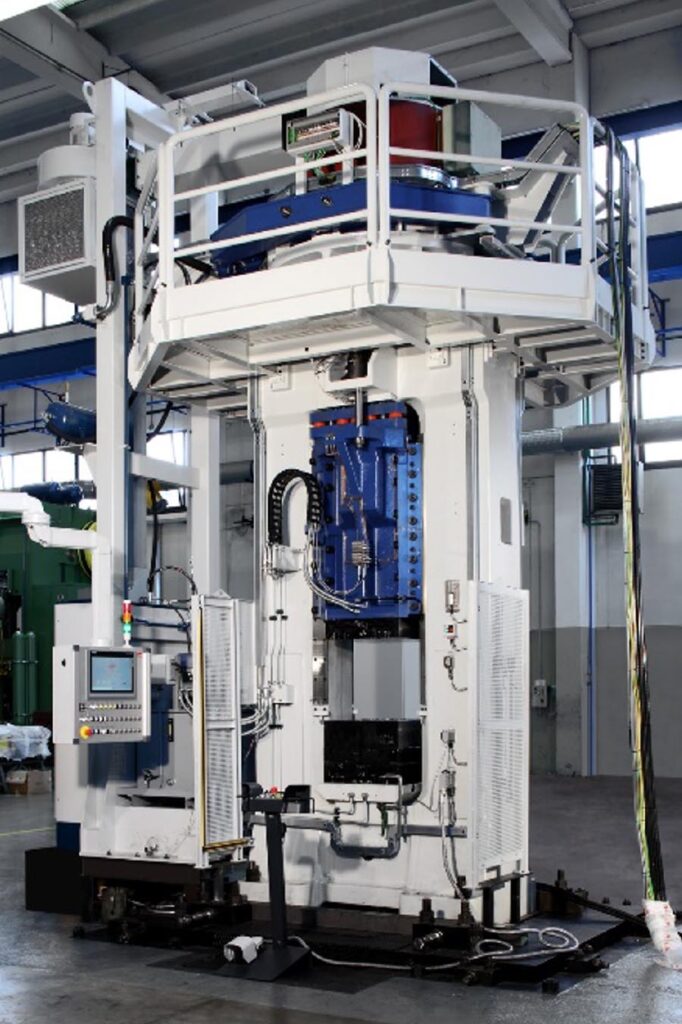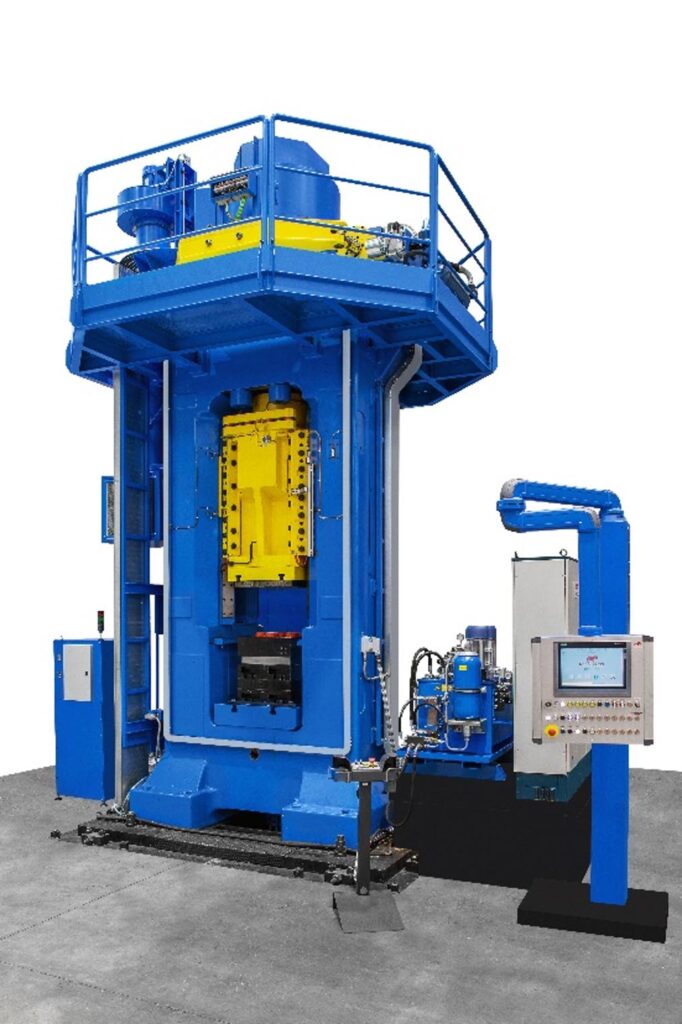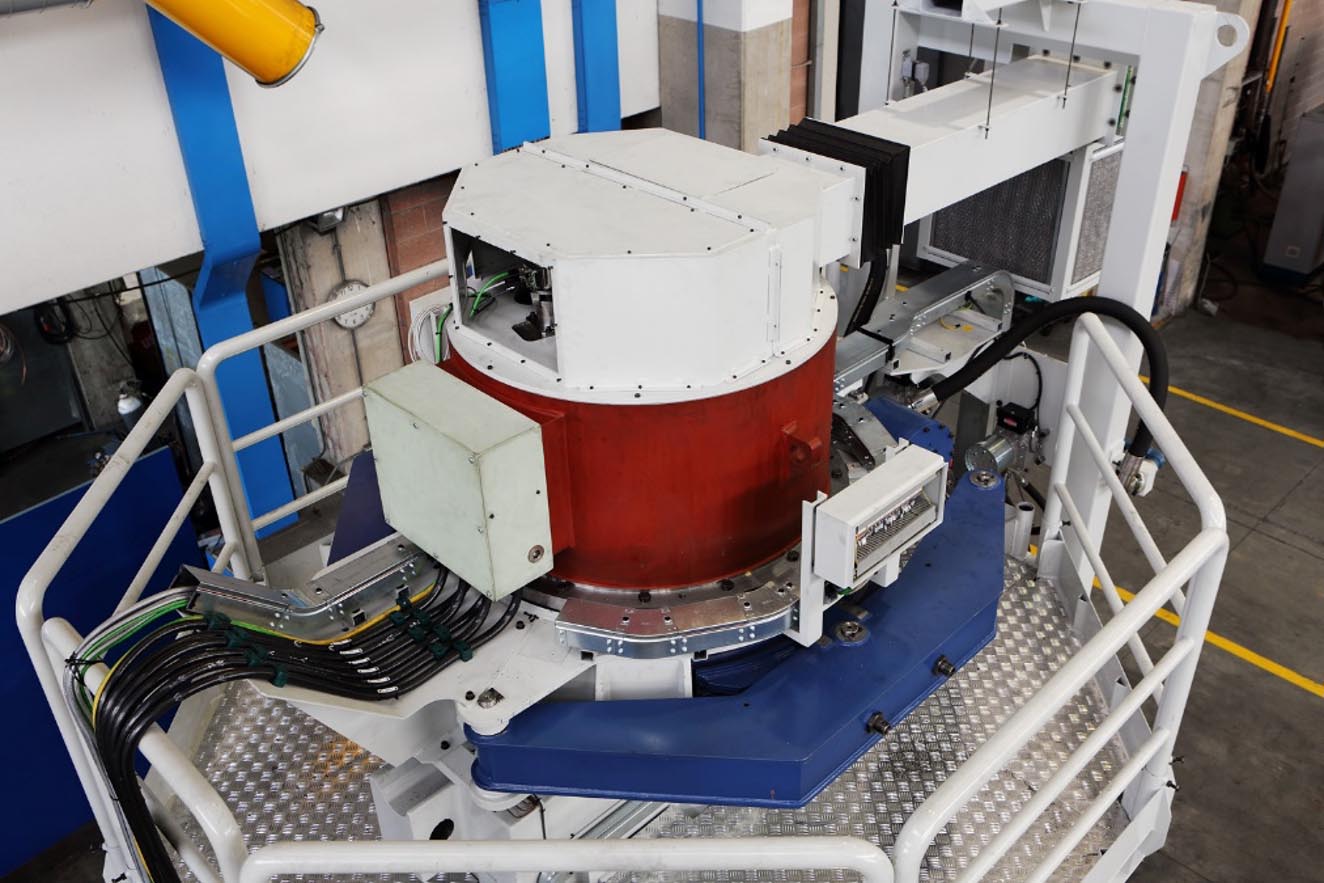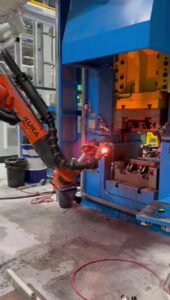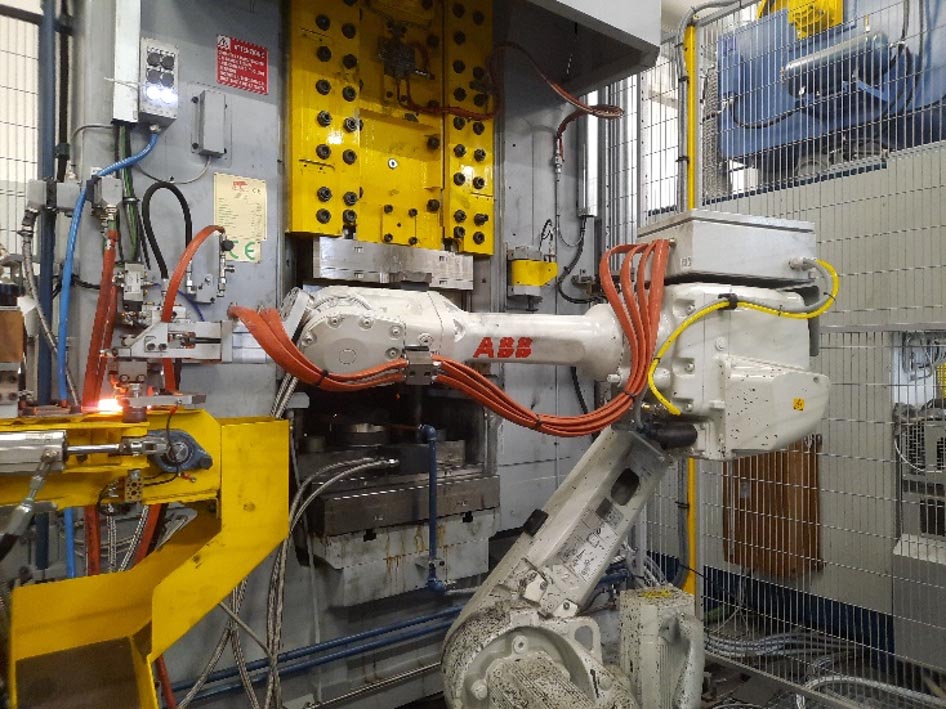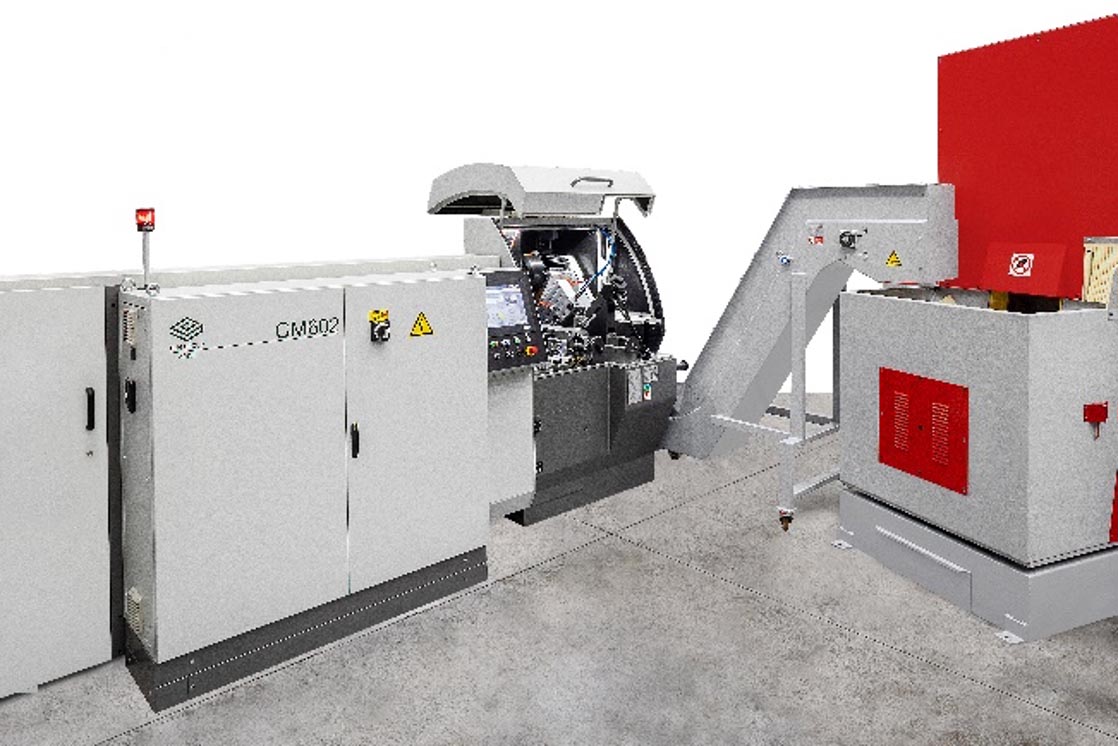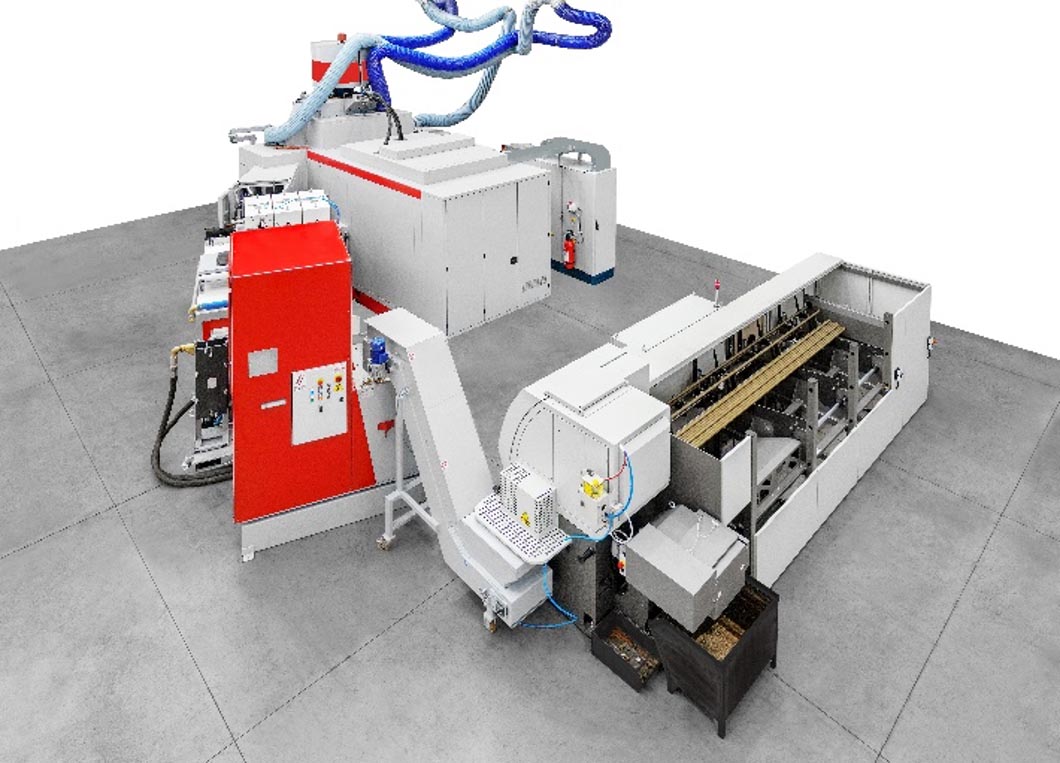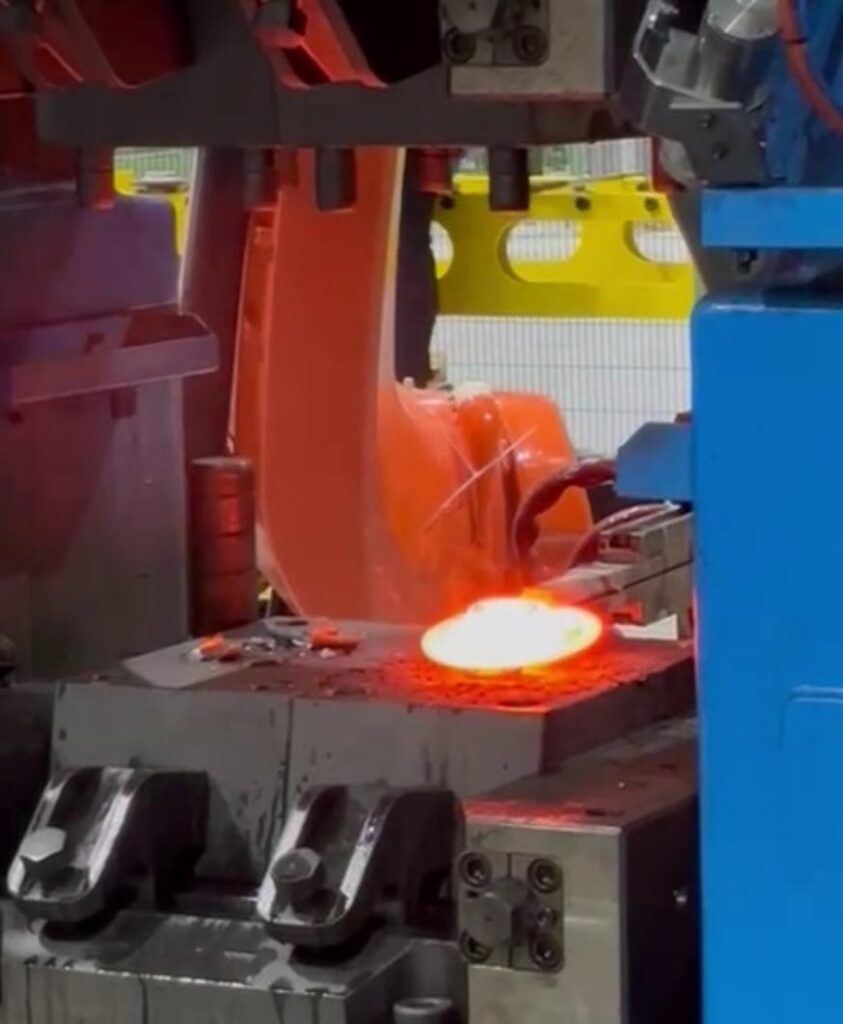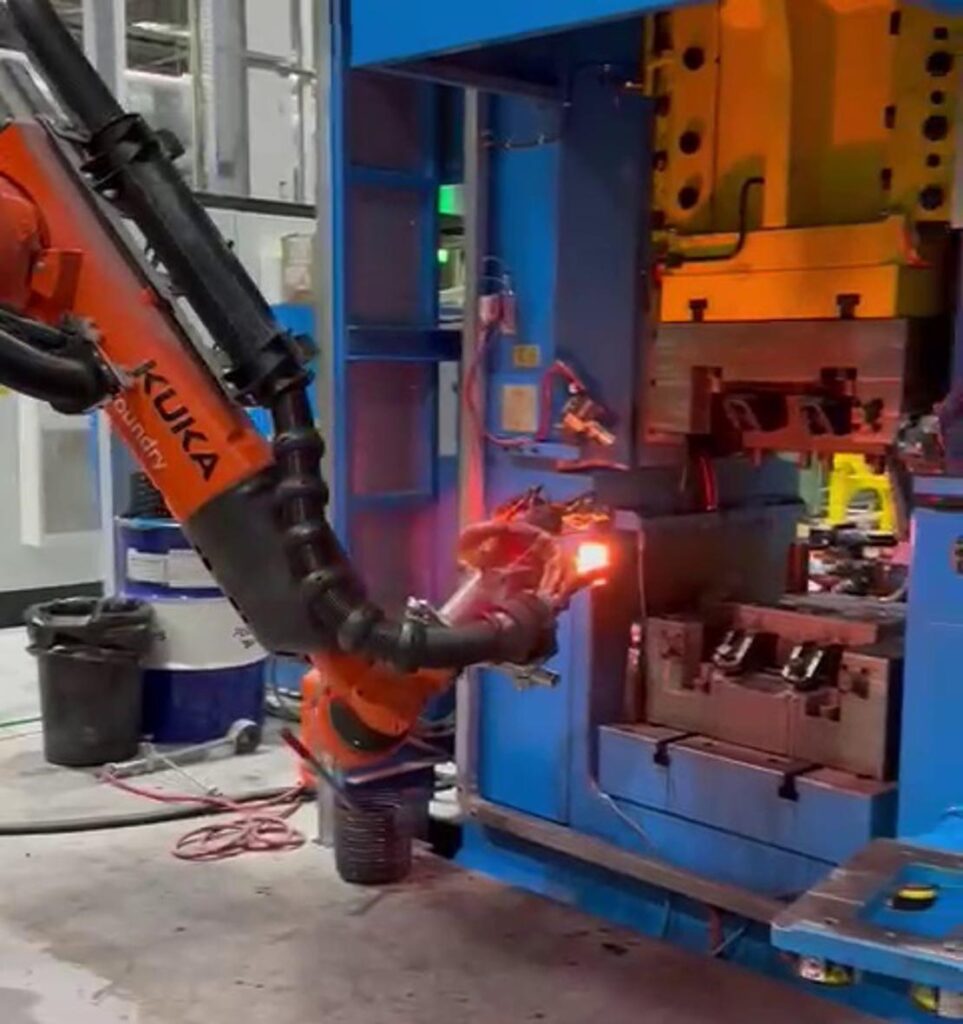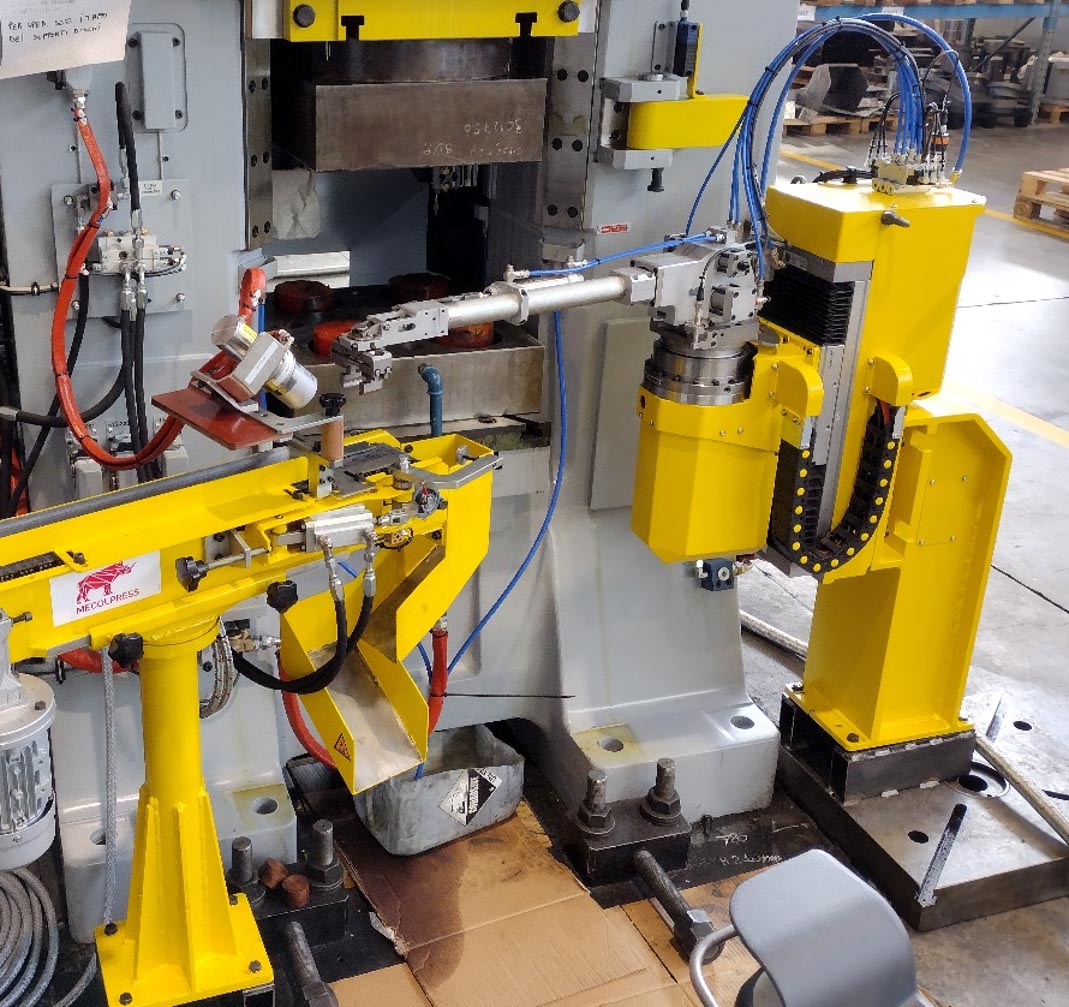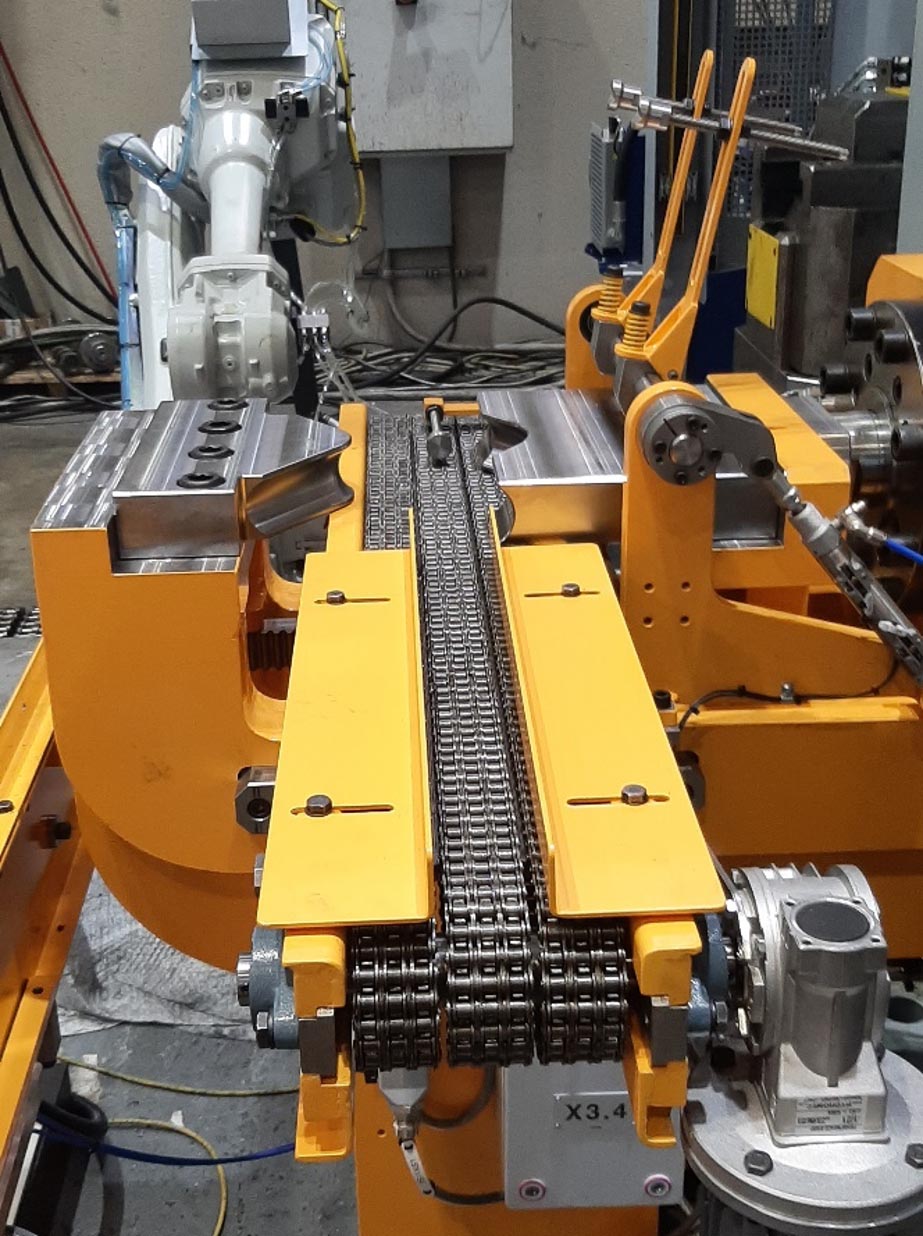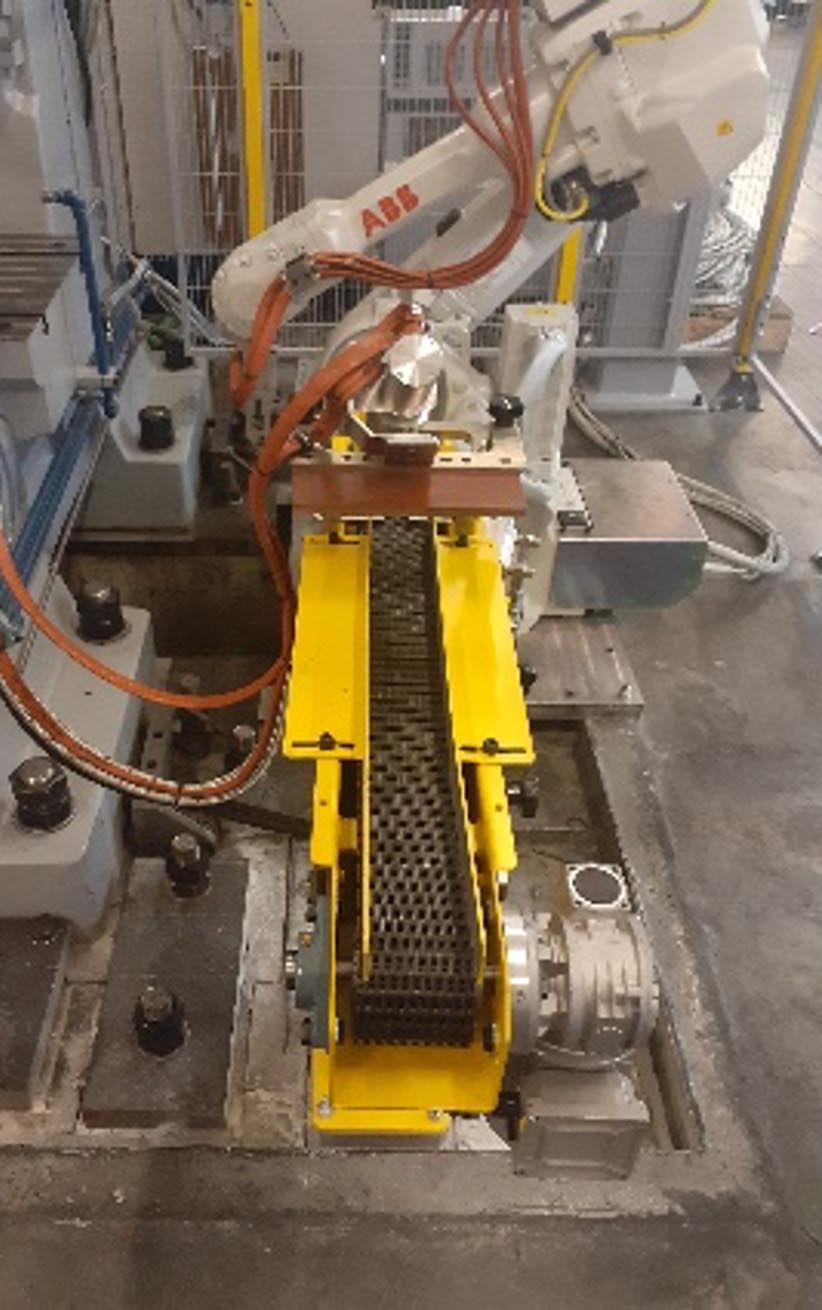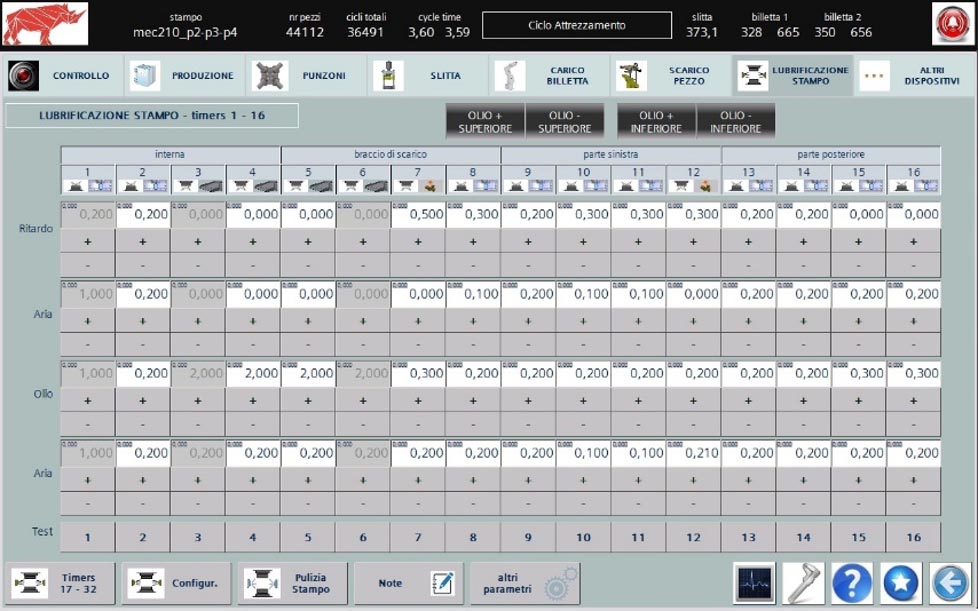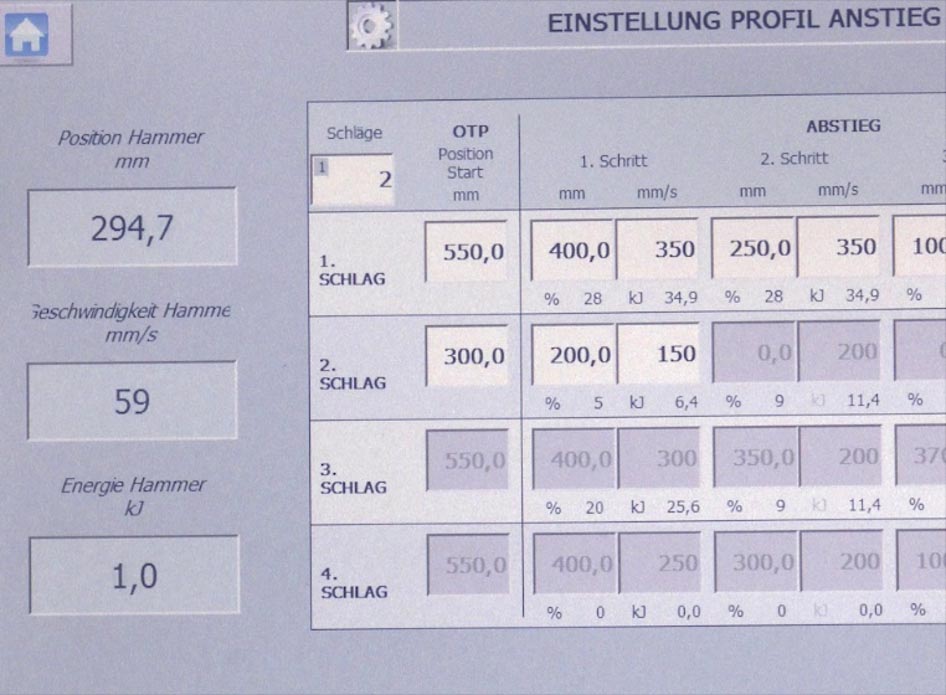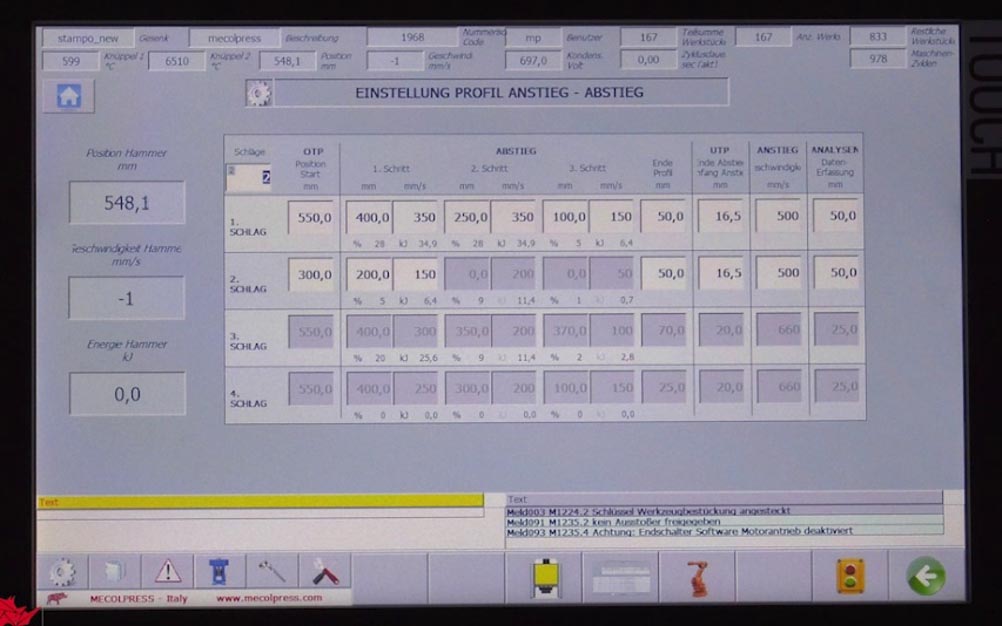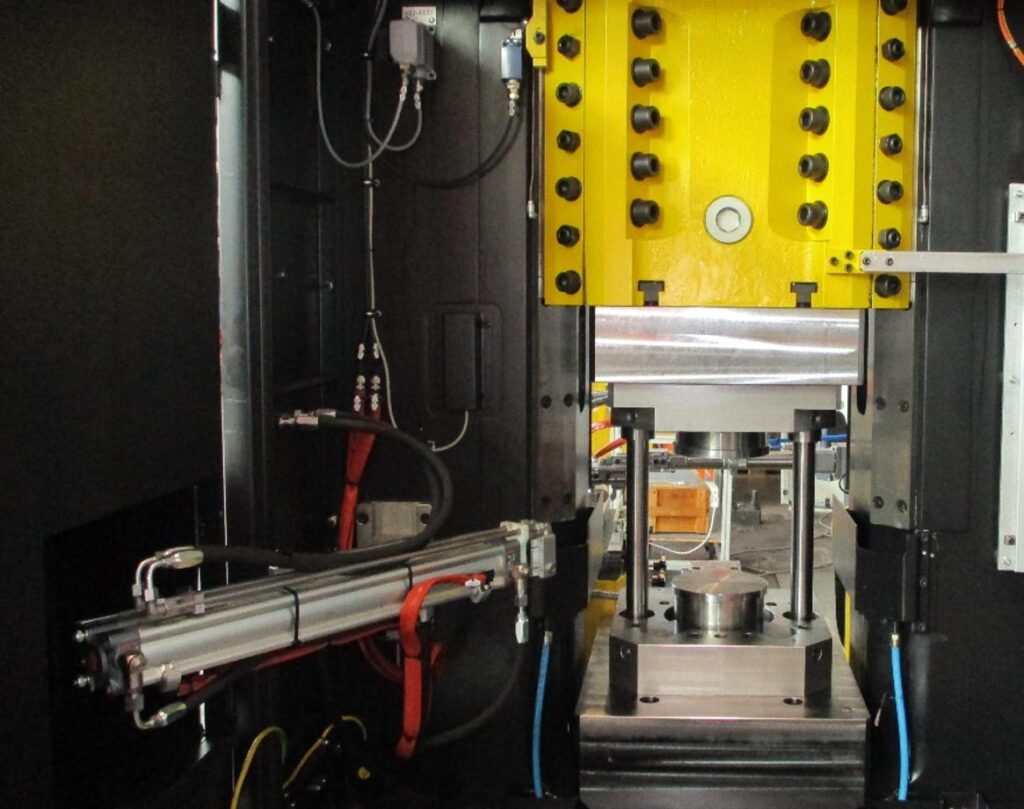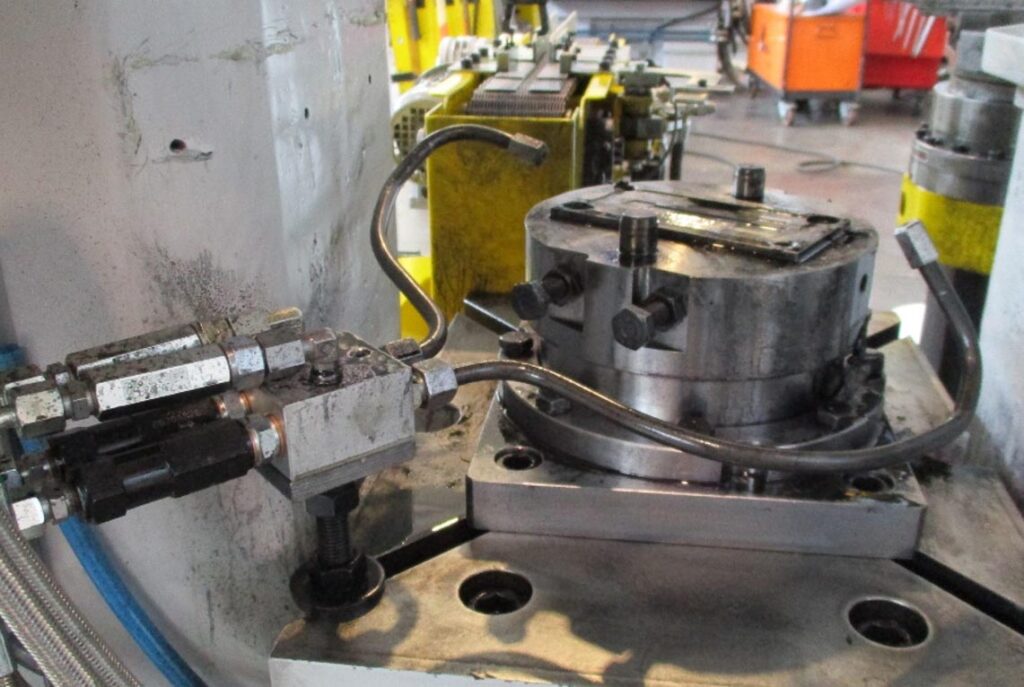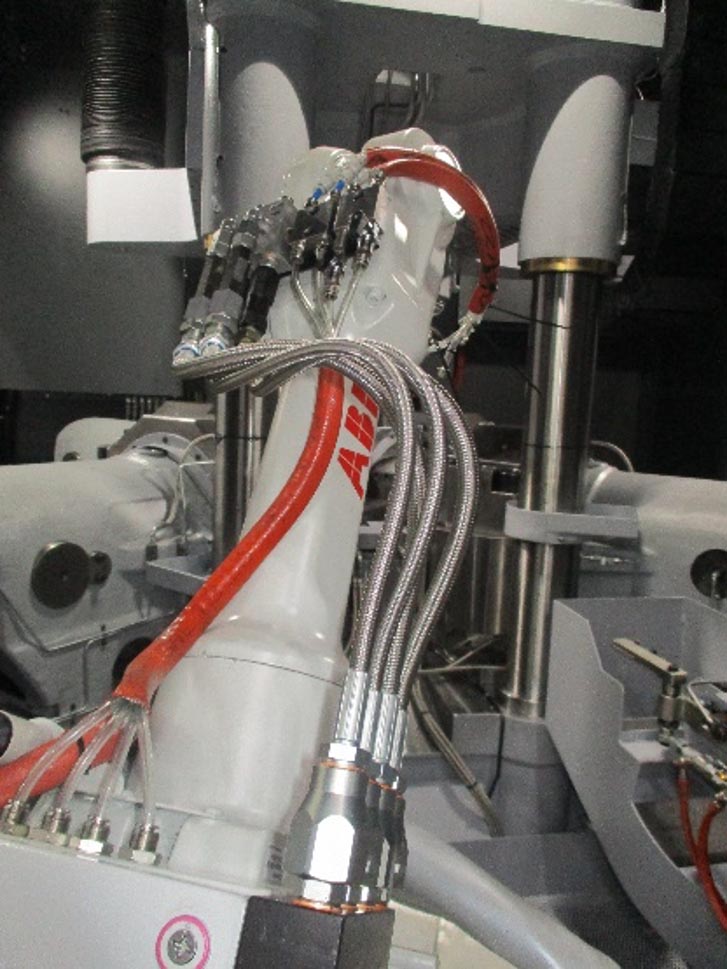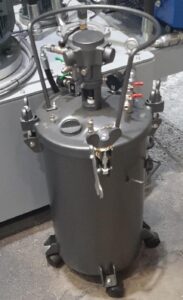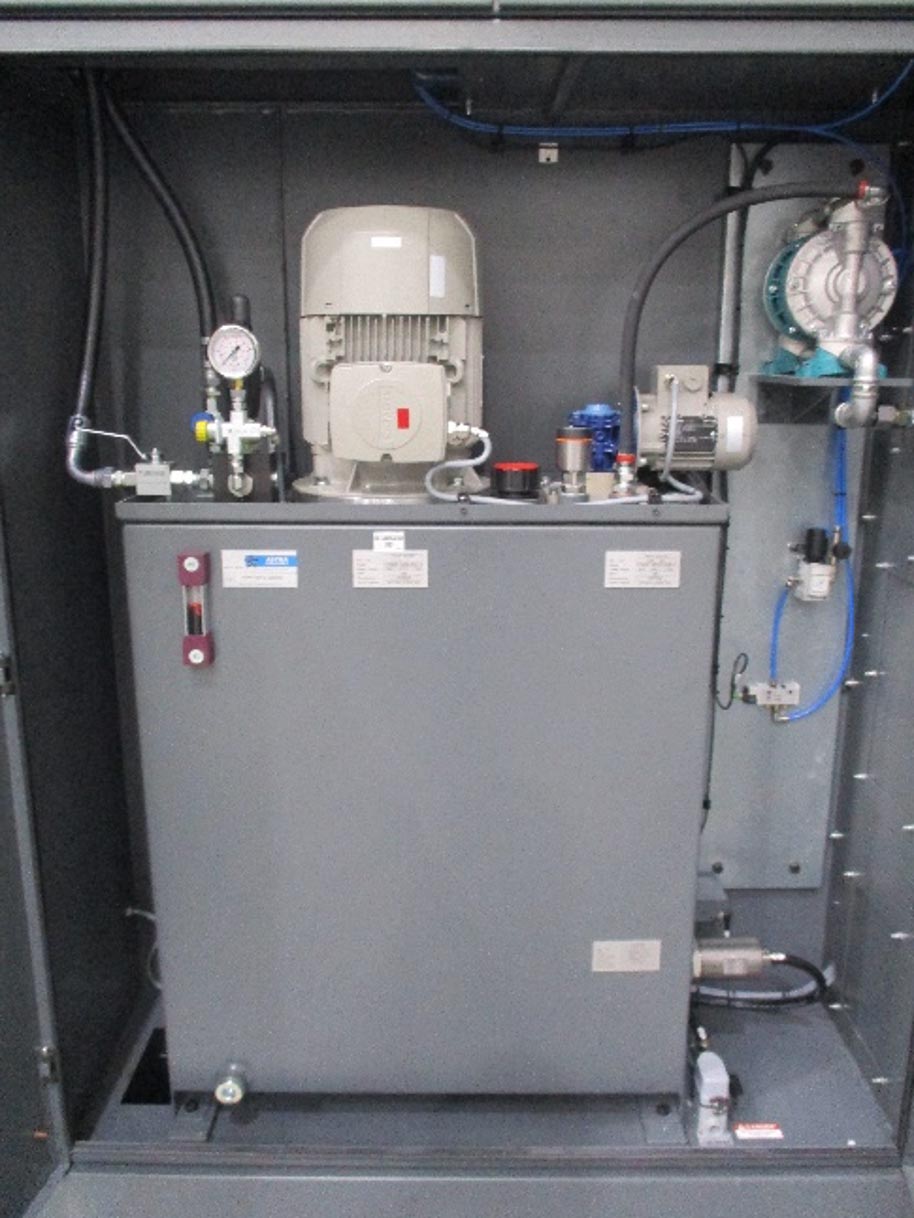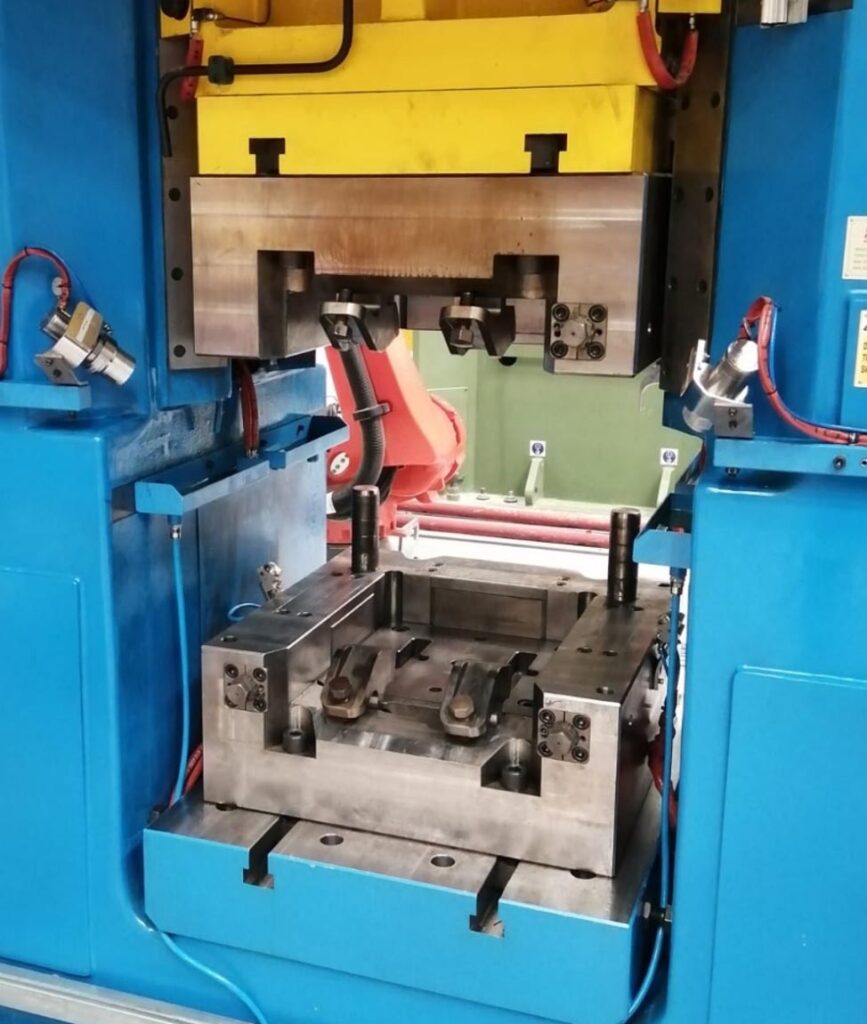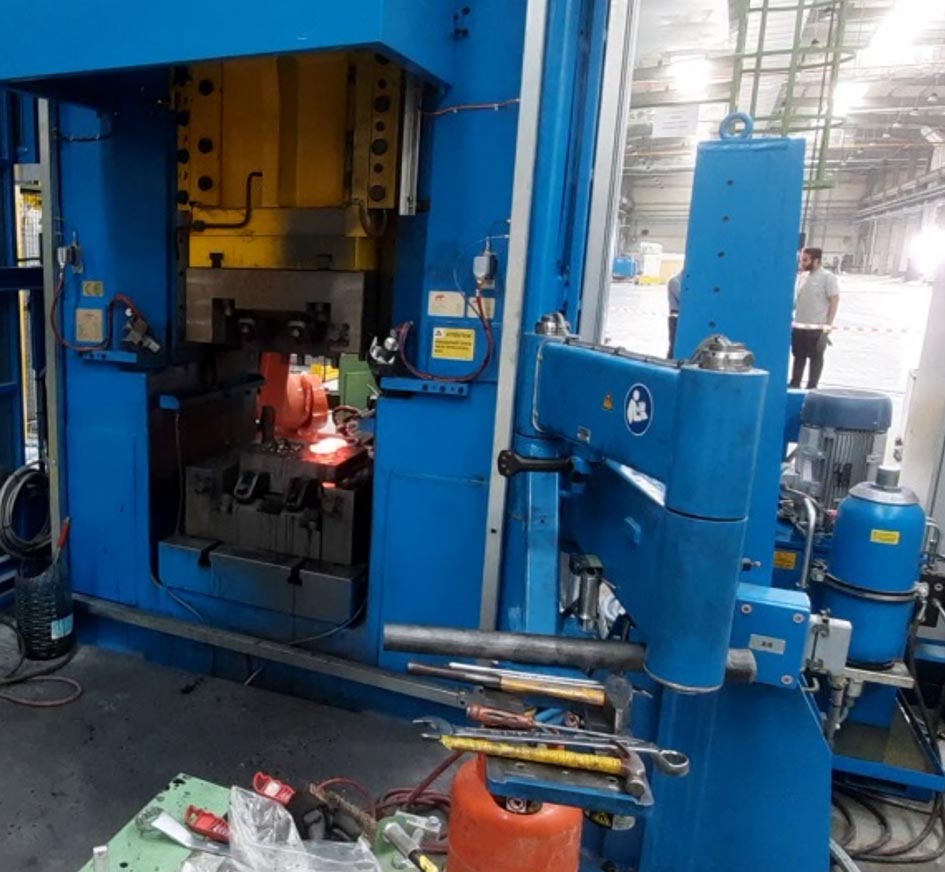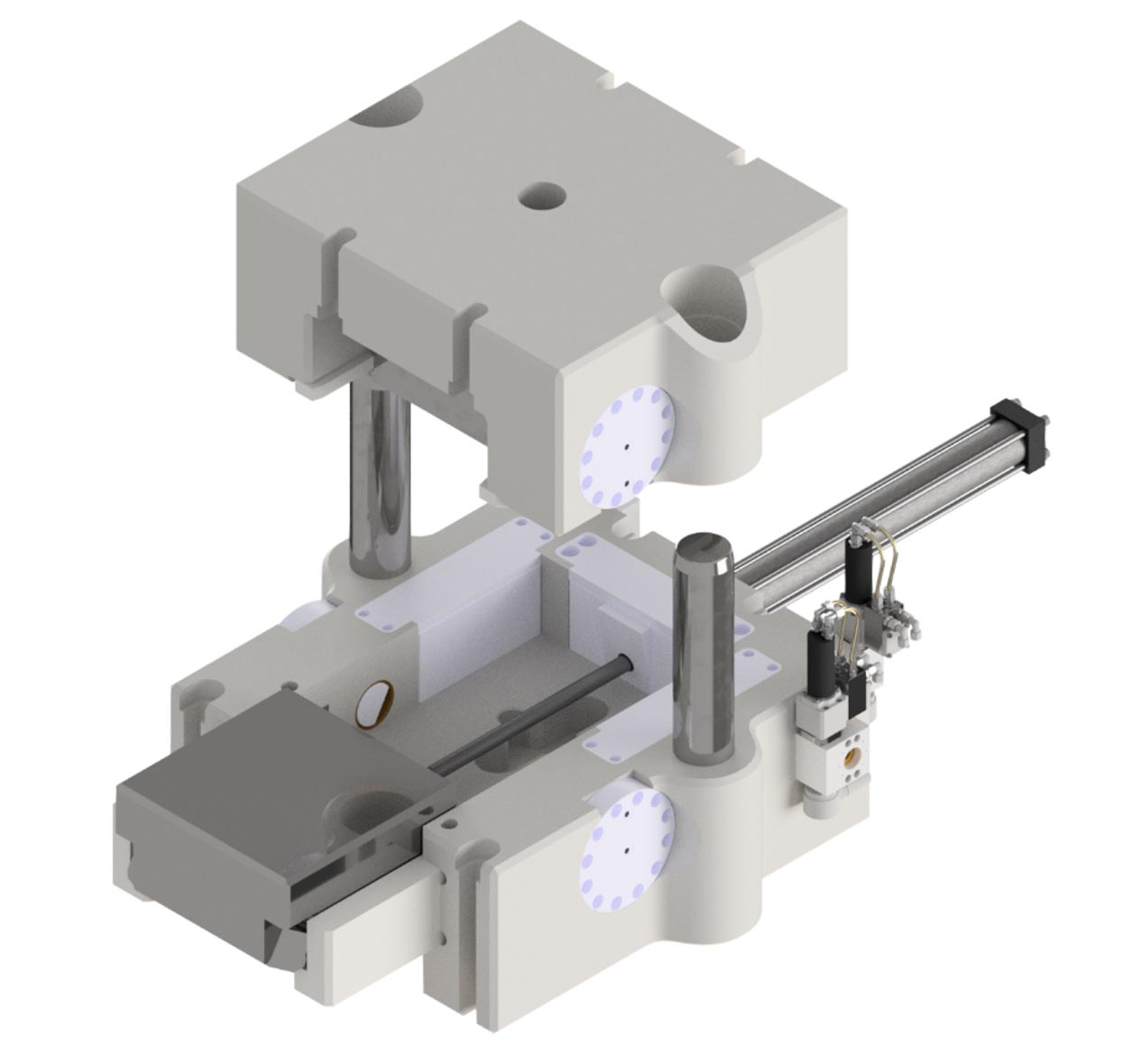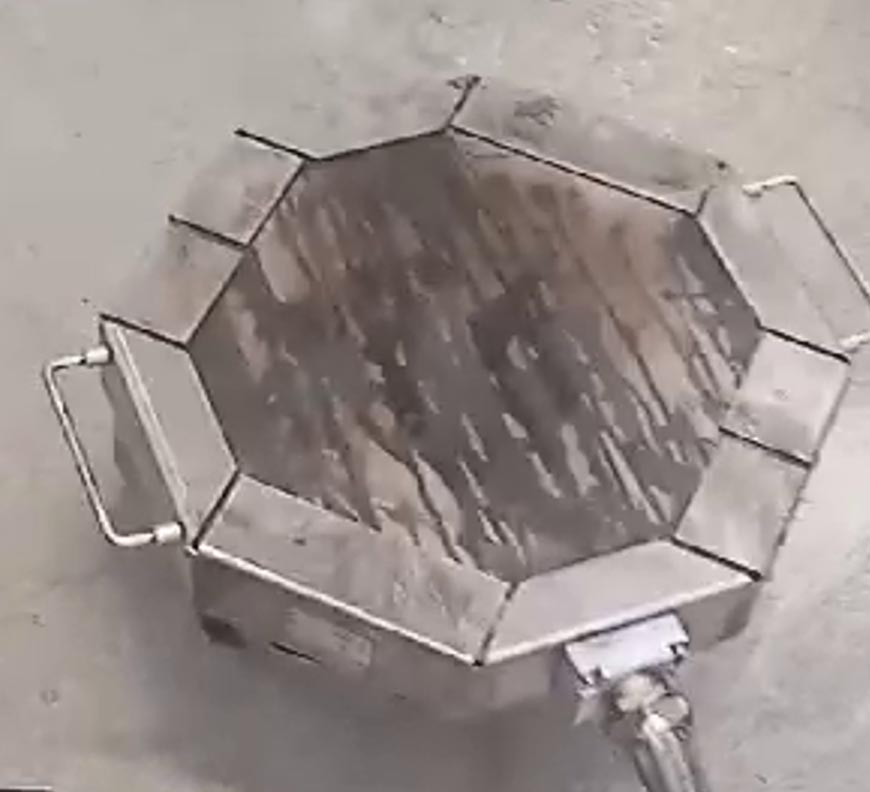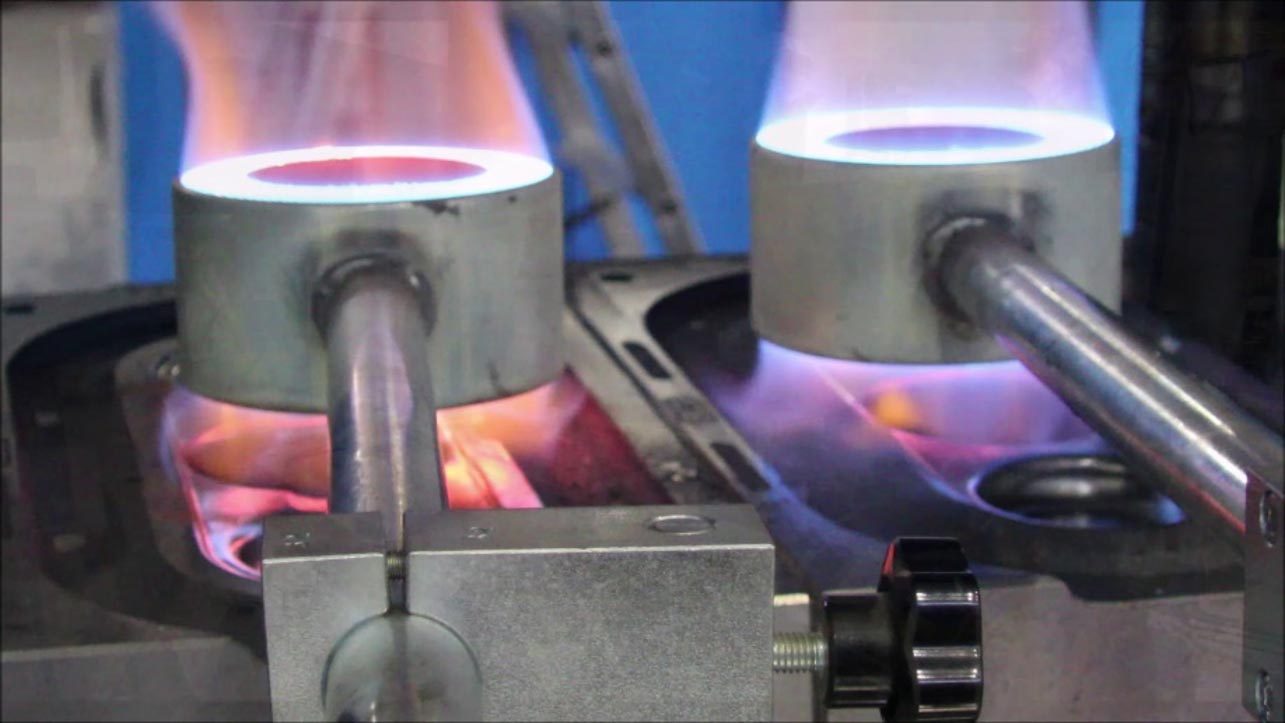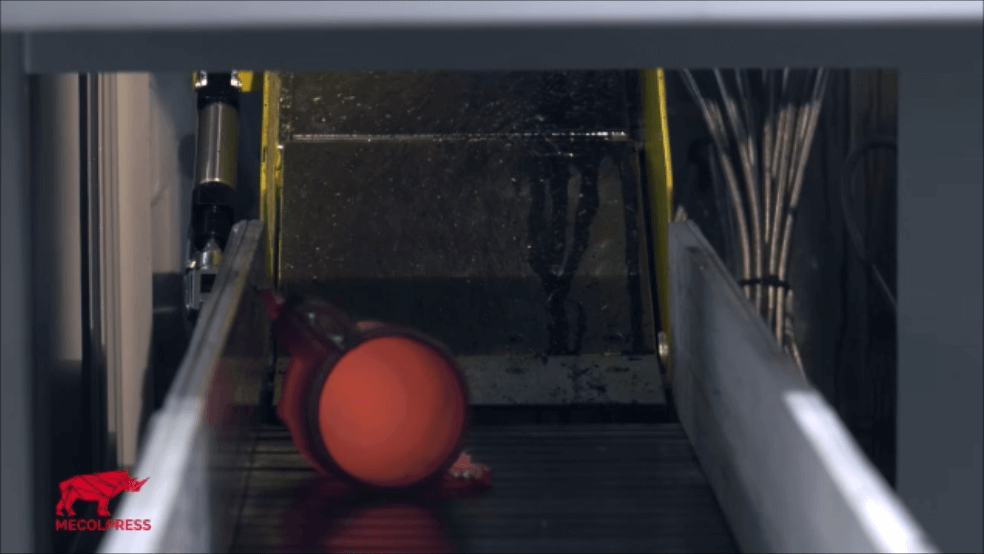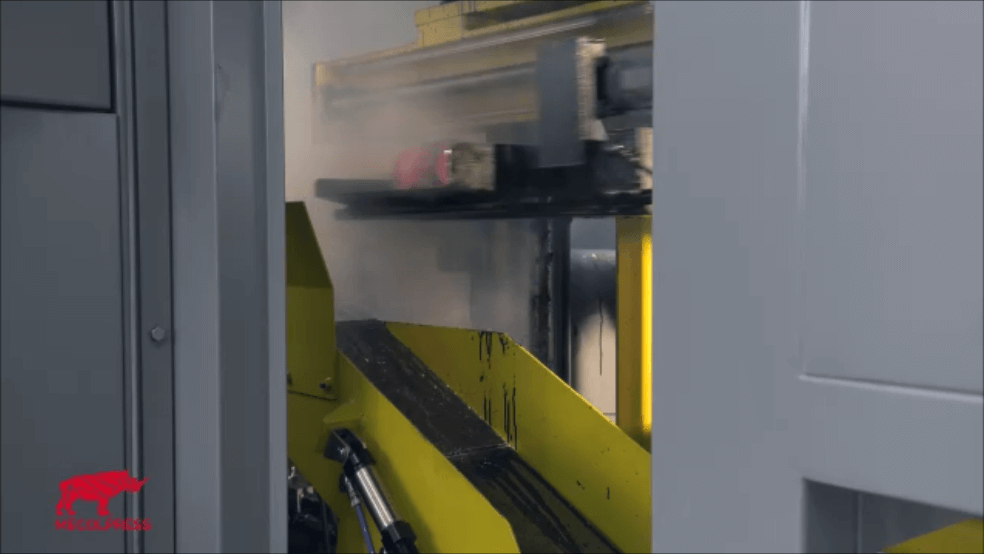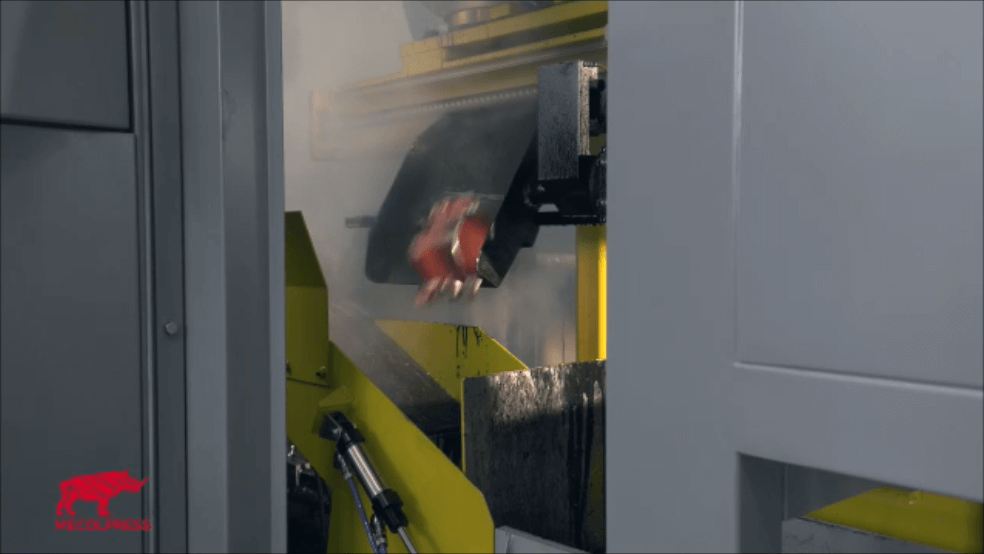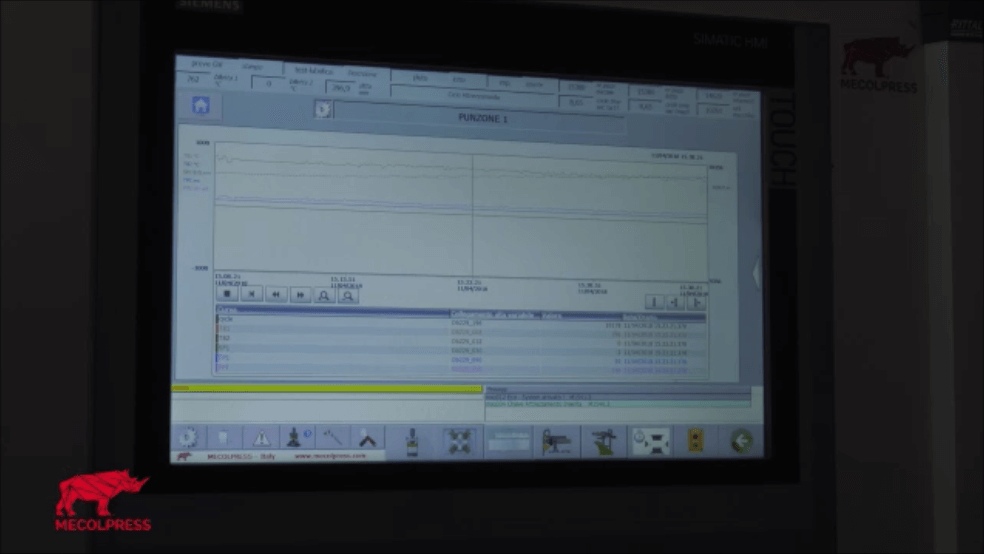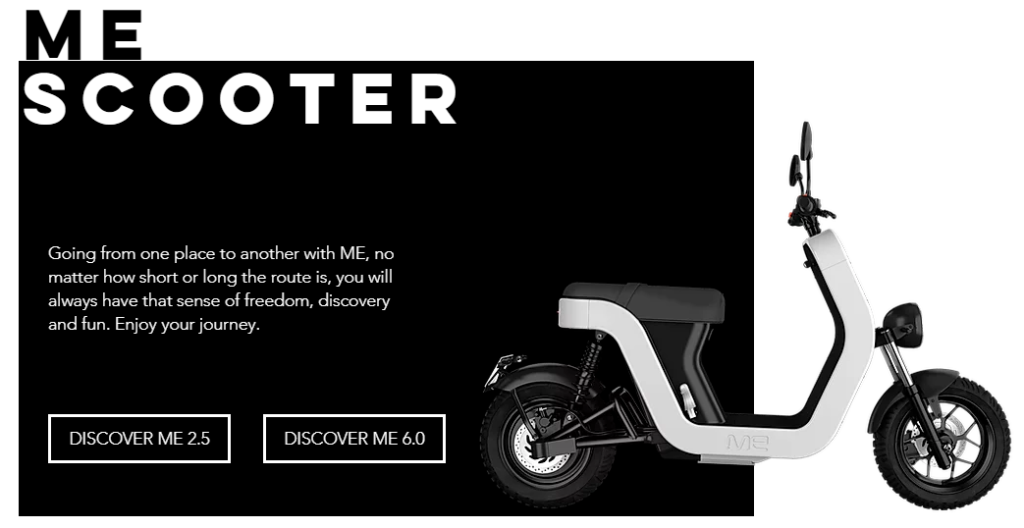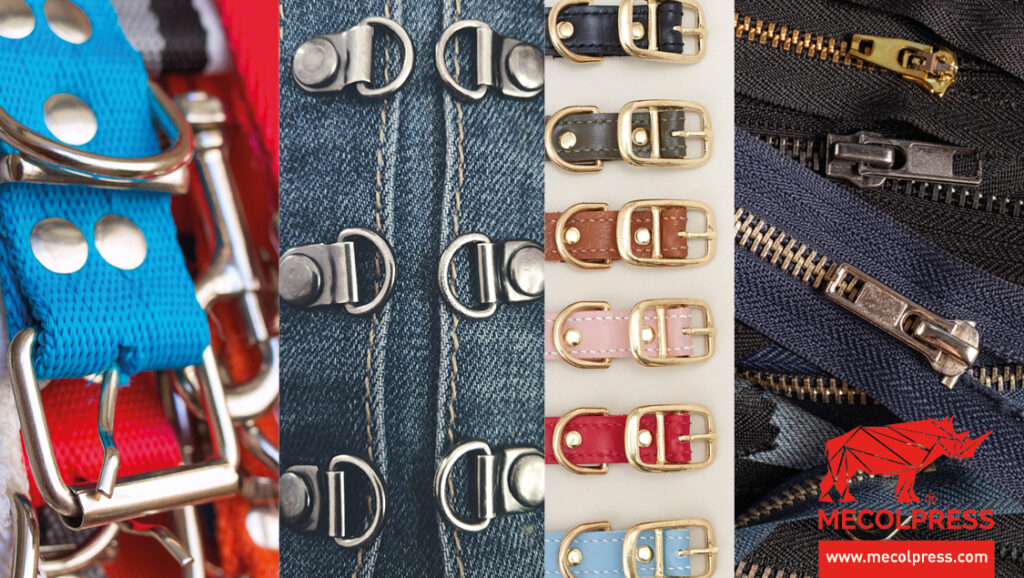
Hot forging in the fashion sector
Hot forging presses are also used in the fashion industry manufacturing.
The worldwide fashion sector is characterized by extremely significant business volumes: around 3 thousand billion euros and it employs 50 million people.
Italy is one of main districts for the fashion industry with historic brands and production chains deeply rooted in the territory.
The sector is affected by global uncertainties linked to inflation, geopolitical tensions, post-Covid recovery but double-digit growth is estimated in the coming years. The increase in business volume is possible thanks to a high dynamism full of creativity and style which canalizes an important flow of news and innovations every season.
The digitalization of sales channels and operational departments and the near-shoring approach have created the need to make the manufacturing process increasingly productive and efficient.
Metals hot forging is a key operation to characterize fashion products and accessories. The logos of the major brands applied on bags, shoes, clothes and belts are made through hot forging and then finished with other downstream processes.
Mecolpress has been the protagonist of this continuous growth process, offering technologically advanced forging solutions with the aim of:
- Increasing production capacity up to 1500 pieces per hour;
- Reducing machine downtimes due to maintenance and tool changes (availability >95%);
- Reducing the consumption of materials, energy and CO2 emissions by 50% (GREEN TECHNOLOGY Industry 5.0);
- Allowing the digital communication between production line and company system and remote diagnostic access (Industry 4.0);
- Flexibility in forging products of different sizes and materials (steel/brass/aluminium);
- Increasing the safety of the production line by reducing human intervention (industry 5.0).
TDS Electrical Torque-Driven Screw presses
TDS Electrical Torque-Driven Screw presses result to be particularly suitable for the hot forging of parts destined to fashion sector.
Here below the 4 strong points that make many customers to prefer these hot forging screw presses:
- Cycle time does not dependent on forging energy => always optimized productivity
- Reduction of friction parts => less maintenance and less energy consumption
- Flexibility in energy settings => production flexibility for product size and type of material (brass, steel, aluminium) and reduction in dies wear
- Energy recovery of braking energy => reduction in energy consumption
Click on the image to enlarge
Complete forging lines integration
Even in the fashion sector, the frequent request is to have complete forging lines.
We can supply the line following the customer need, so in addition to the hot forging press, we integrate the cutting, heating, forging and deburring of the forged pieces.
Click on the image to enlarge
The presses for forging of parts destined to fashion sector have to optimize the process phases:
Automation of machine loading and unloading
We underlined the importance of automating the loading and unloading phases of pieces. The presses must include certain solutions to guarantee maximum performance:
- High-speed Cartesian systems for heated material loading.
- Flexible anthropomorphic robots for heated material loading.
- Unloading of the forged product via air blow to avoid sliding and contact defects.
- Folding of the material to be forged to have a shape as close as possible to the forged parts and to reduce material consumption.
- Possibility of different shapes of the starting material from the traditional round billet to customized shapes (letters, symbols, …).
Click on the image to enlarge
Productive process data control system
An important solution to take into consideration to start a successful hot forging project for parts in the fashion sector is certainly to equip yourself with a control system of the productive process.
Mecolpress Calipso Software allows to monitor and to adjust the data connected to forging process, and it presents numerous advantages, among which:
- Based on HMI architecture complete with touch screen display
- Functioning parameters of the press and of the auxiliaries that can be inserted from the display.
- For each forging cycle, the main parameters are saved for collection and analysis.
- Integrable with company MES/MRP systems.
- Remote access for diagnostics and problems solving
Click on the image to enlarge
Dies lubrication
The proper dies lubrication makes the difference for a successful hot forging process.
A correct lubrication does not mean a lot of lubrication, but it must be properly dosed, the most suitable lubricants must be chosen based on the metal to be forged and the required piece.
We propose:
- Automatic air-oil lubrication unit managed by the control panel.
- Up to 30 lubrication points.
- Automated lubrication arm synchronized with the forging cycle.
Click on the image to enlarge
Dies changing system
To allow a quick unlocking, the die holder has been optimized, and the auxiliary arm becomes essential for bringing the dies out of the working area of the press.
Click on the image to enlarge
Dies pre-heating
This is an important phase of the hot forging productive process that foresees the use of modern induction technologies avoiding open flames or CO2 emissions.
In the fashion sector, therefore, hot forging presses and related devices are widely used.
It is always important to develop an accurate and successful forging project to maximize profits and reduce waste.
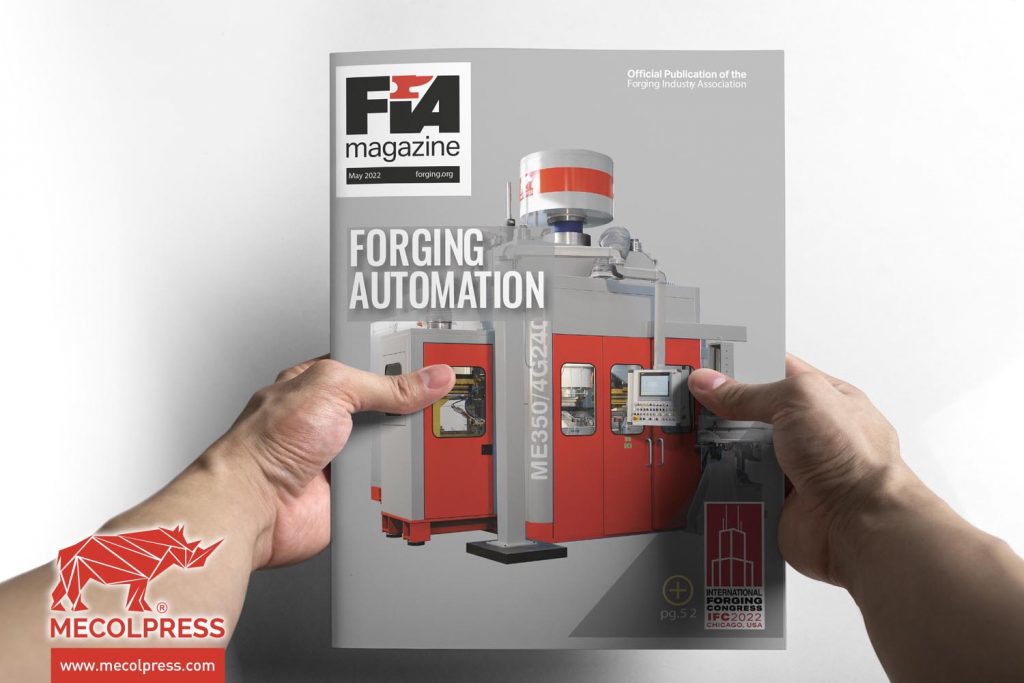
Smart Brass Forging
We report the article below FIA Magazine, the Forging Industry Association, that speacks of us.
Smart Brass Forging
By Danilo Fagnani
MECOLPRESS started their activities in Brescia (Italy) more than 50 years ago, in 1969, providing solutions for the hot brass forging industry. MECOLPRESS then widened its portfolio including hot forging steel, aluminium, titanium, and special alloy applications. MECOLPRESS is now offering the most modern technologies available for mechanical (HEAVY family), hydraulic (ME Family) and screw driven (TDS, FPN family) presses.
The region of Brescia, located East of Milan, is generally considered the cradle of brass production, at least 20% of the total world production is firmly located here. The Brescia region is still able to compete with Chinese brass manufacturers (35% of the brass total world production) even if the production costs are not comparable in terms of manpower, energy and etc… The secret of this success is the know-how of the full brass production chain, industrially started from the 19th century, from melting process passing through forging then achieving the final product completion. MECOLPRESS was born and built in this interesting and dynamic environment, participating and contributing to solve the main challenges of brass producers (Smart Brass Forging).
These challenges are cyclically recurring in the market, and they can be summarized as follows:
- raw materials availability and costs;
- high variability in the market for parts from the peaks of high demand to small lots with frequent parts changeovers;
- difficulties to find the necessary manpower, from highly skilled operators, to maintenance technicians, to standard operations workers;
- availability to grant the best products quality reducing the non- compliant ones;
- reduction of the energy consumption approaching the green economy
MECOLPRESS is supplying to the market the most powerful hydraulic presses (ME family) offering horizontal\vertical coring performances achieving:
- flash-less forging;
- reduced part material thicknesses;
- deeper and deeper punch coring
These features drive achieving parts with less weight and avoiding any further downstream process as trimming. ME hydraulic presses family (more than 60 units supplied from 2010) has standard sizes:
- 100 to 500t as die closure force
- 30 to 350t of punch coring force
The coring punches have independent movement guiding and optimizing the flow of material inside the die’s cavity. The punches forces, speeds, displacement sequences can be flexibly implemented in the HMI operator panel depending by the products to be forged (Smart Brass Forging). One of the four horizontal punches can be orientable (without losing coring force!) with the variable angle from from 0 to 45° allowing sloping coring for the parts.
The ME family hydraulic presses grant production performances that, depending by the equipment size, can reach up to 30 cycles per minute and they allow to forge multiple parts per stroke, throughout of some thousands of parts per hour is easily achievable. This will allow to complete productions lots is shortest time even if they are relevant in the number of parts to be reached. If the market conditions are changing and the market moves to lower number of parts per lot with frequent shifting between the products, the quick dies changing system will allow to dramatically reduce the down time. The fully automatic tools locking\unlocking and the servo-moved supporting arms allow one operator to accomplish the change in the quickest time (about 15-20min), in the complete safety conditions and without the help of any tools (Smart Brass Forging).
Mecolpress ME Next Generation series hydraulic press hot forging EG coring tool
The MECOLPRESS policy to reserve relevant stock of spare parts for all the presses that have been supplied is a key point to avoid unwanted down time in case of maintenance of the equipment.
Mecolpress ME Next Generation series hydraulic press outstanding parts weight reduction
MECOLPRESS is developing all of the control software for the presses: CALIPSO (Smart Brass Forging). This user interface is based on a touch screen model, it is very easy and intuitive, and it has been developed in several different languages; it allows any end user operator to work with continuity on the press and it does not require any particular skills or knowledge. Many functions have been simplified as input parameter requests to reduce the human factor effect in the press working conditions. CALIPSO defines and controls automatically all the ME family presses operations, from raw material loading up to forged parts unloading. The main parameters of each product receipt are saved in the internal memory, and can be easily retrieved for future production and transferred to customer MES\MRP. The press has an Ethernet OPC-UA connection module that grants this function as well the remote teleservice assistance by the MECOLPRESS technicians.
The MECOLPRESS R&D department is able to define the optimized process parameters and/or the best die geometry through FEA software which allows them to analyze both material flow and forging force. This on-demand service is appreciated by customers who are searching for a reliable supplier.
ME hydraulic presses can be paired with all types of furnaces: billets, bars, natural gas, electric induction, keeping in mind that the reliability on the heating temperature, the billet weight tolerance and the material metallurgical microstructure properties are key parameters to grant effective flash-less process success.
High production capacity, flexibility to switch from one product to another and high equipment reliability vanish if the forging process is not under full control. CALIPSO software is leading the game supporting the customers to control, with minimal effort. The forging forces, punches displacement parameters and sequencies, billets temperature, and so on can be monitored in the maximum\ average values or continuously during the working cycle. The desired thresholds can be set in the system to monitor the trends of the parameters and if any mismatch is found, the parts can be diverted automatically to the dedicated collecting box for further checking.
MECOLPRESS is fully committed to be an effective part of the green transition of the industry, reducing the energy consumption, pollution emission, and media consumption. This application shall not decrease or compromise the outstanding powerful performances of the ME family presses. CALIPSO and in-house engineering are the main characters of this target:
- hydraulic auto-adaptive regenerative function circuits;
- ECO mode for working pressure optimization;
- actuators optimized geometry;
- flexible set up of the operating pressure;
- AC frequency converters\variable flow hydraulic pumps;
- CALIPSO software that learns from experience optimizes the working parameters without relevant operator required intervention (Smart Brass Forging)

Mecolpress ME Next Generation series hydraulic press main view
These points collaborate to reduce the energetic consumption up to 50% in comparison with standard technology presses.
The dies lubrication system, very important in the flash-less forging, is using innovative pipe to pipe technology supplying alternative air and oil flows just with the needed quantities. All the dies lubrication parameters are set into the control software and up to 30 points can be reached; they can be integrated into the dies or with external nozzles. The proper pumps are installed on the machine bottom to collect all the remaining quantity of oil avoiding any overflow. The press lubrication is selective and only the components active are reached by the media, proper collecting box avoid leaking. No more waste of fluids!
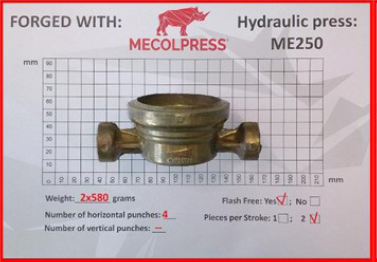
Pressa idraulica Mecolpress ME Next Generation: esempi di particolari stampati a caldo senza bava
Mecolpress ME Next Generation series hydraulic press four parts flash less hot forging examples
The innovative suction hood embedded in the press structure collects the emission very close to the sourcing point, decreasing any possible spread into the environment and granting the best cabinet inside view of the process to the operators.
As all MECOLPRESS products, the ME series fulfills the most severe international safety standards and can be produced in compliance with North American and Canadian ones.
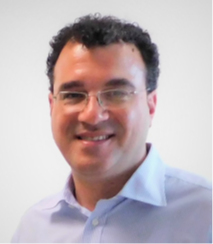
Danilo Fagnani Sales Manager Mecolpress
Danilo Fagnani Sales Manager Mecolpress Spa
Phone: +39-030-2560110
Email: d.fagnani@mecolpress.com
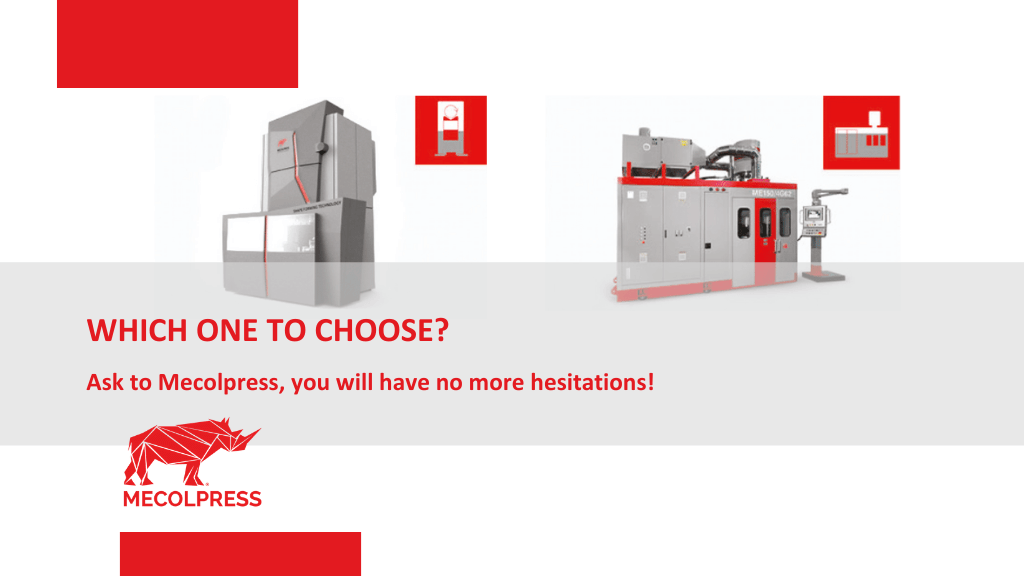
Are you doubtful between mechanical press and hydraulic press?
Are you doubtful about the press to choose? Mechanical press or hydraulic press?
Ask to Mecolpress, you will have no more hesitations!
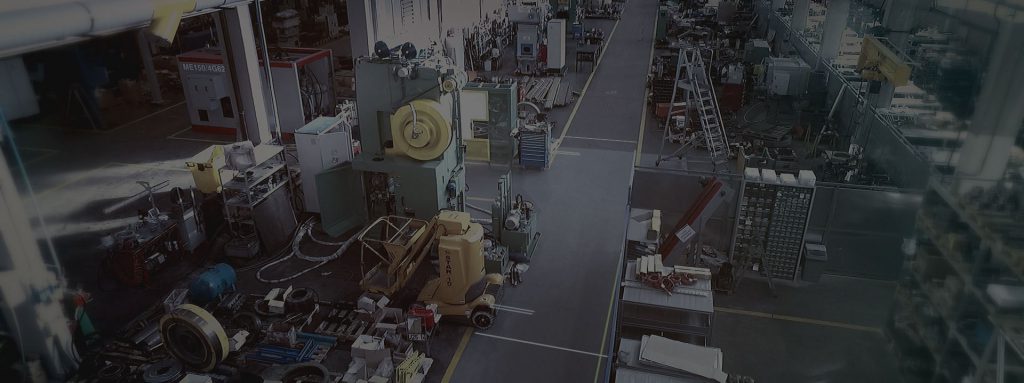
You have just got a new commission and you need a new press for hot forging. Are you sure that you can identify the press that best suits your needs?
Typical request
It often happens that a Customer, or potential one, comes to us with the part he desires to forge. Usually it’s about complex situations, very far from standard applications. That’s exactly why the Customer asks for our help and support.
If the Customer is not a newcomer in the forging world, he usually arrives in Mecolpress with clear and straight idea about the type of press he wants. But very often it happens that he will change his view after having the possibility to get in contact with our forging know-how!
You ask for a mechanical press but you need an hydraulic one!
For example, some weeks ago two different customers came to visit us bringing some sampling to be forged. They were sure to ask a quotation for a mechanical press, they realized instead that the right machine for their situation was a hydraulic one!
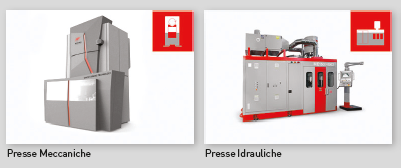
Both our customers had the chance to test new dies, only 4 hours were needed for the preparation and installation of the dies and to run some tests. Even though the furnace was not the best one for their kind of production, because it’s a furnace that Mecolpress uses for testing, the machine gave a flash-free part in only 4 hours, with a saving of about 30% of material and with a quality definitely superior than the one they could achieve using a mechanical press.
Moreover, it is important to take into consideration the limits of the mechanical press:
- Since the part is not balanced, the mechanical press should use all its possible force to forge it.
- Working in this way the risk to run into damages or machine breakdown becomes greater.
On the contrary, The ME hydraulic press can forge the part better. The forged parts which required more force used however less than 200 tons on a punch, therefore it consists of a forces distribution that is totally different compared to the traditional mechanical press.
Often the customer is skeptical towards the hydraulic press, but just because he is not familiar with it!
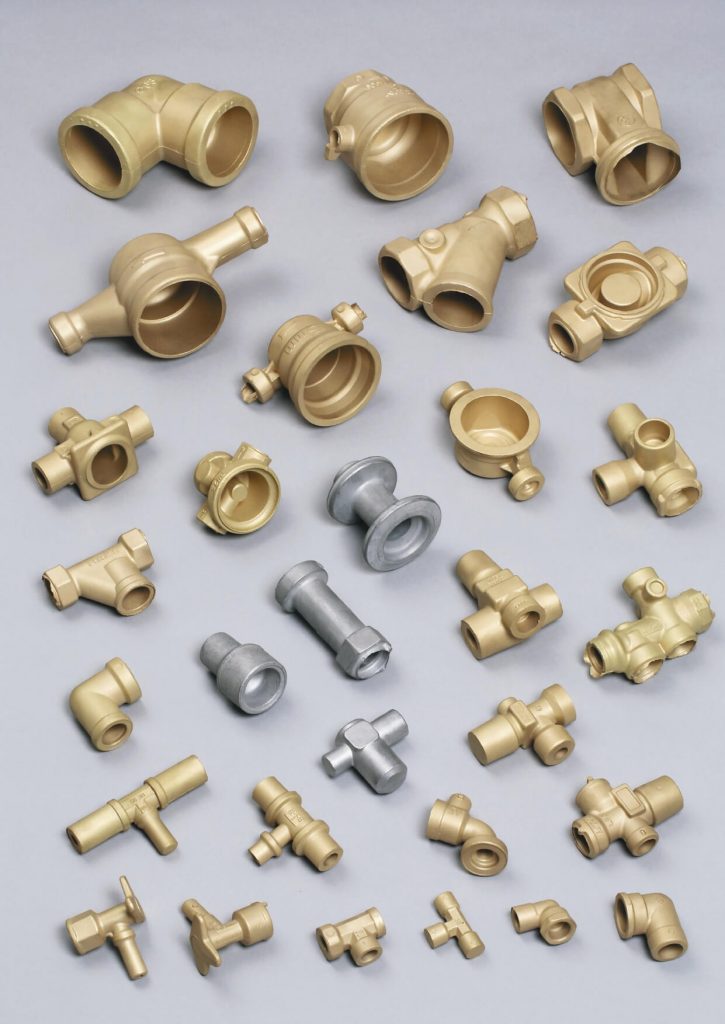
Find out more about the hydraulic presses
The hydraulic presses patented by Mecolpress are suitable for the hot forging of standard parts or special parts in brass and aluminum. The dies closure force is higher than the one of the traditional mechanical presses and the independent and controlled movements of the ram and of the extruders allow to hot forge also complex parts without flash.
These are oleodynamic presses provided with coring tools combinable till to a maximum of 5 punches (4 horizontal and one vertical) suitable for the hot forging of brass, aluminum, copper and other materials.
Compared to the traditional mechanical presses these presses have different advantages, including:
- Reduced vibrations and noises.
- No foundations are required.
- Higher flexibility: there are no mechanical connections between tooling and ram; this implicates that you can decide speed, force, position and movement sequence for each punch independently. The result is the possibility to decide how to let the material flow, this helps the part production with a better quality level.
- Ease of tooling: easy access to the forging area and automatic adjustment of punches strokes from the panel that cancels the mechanical adjustment on the spines (for example insertion of spacer).
- The press is easy and intuitive to be used even without a great experience in the forging field. Together with the machine a lifelong service via teleservice and phone assistance is provided.
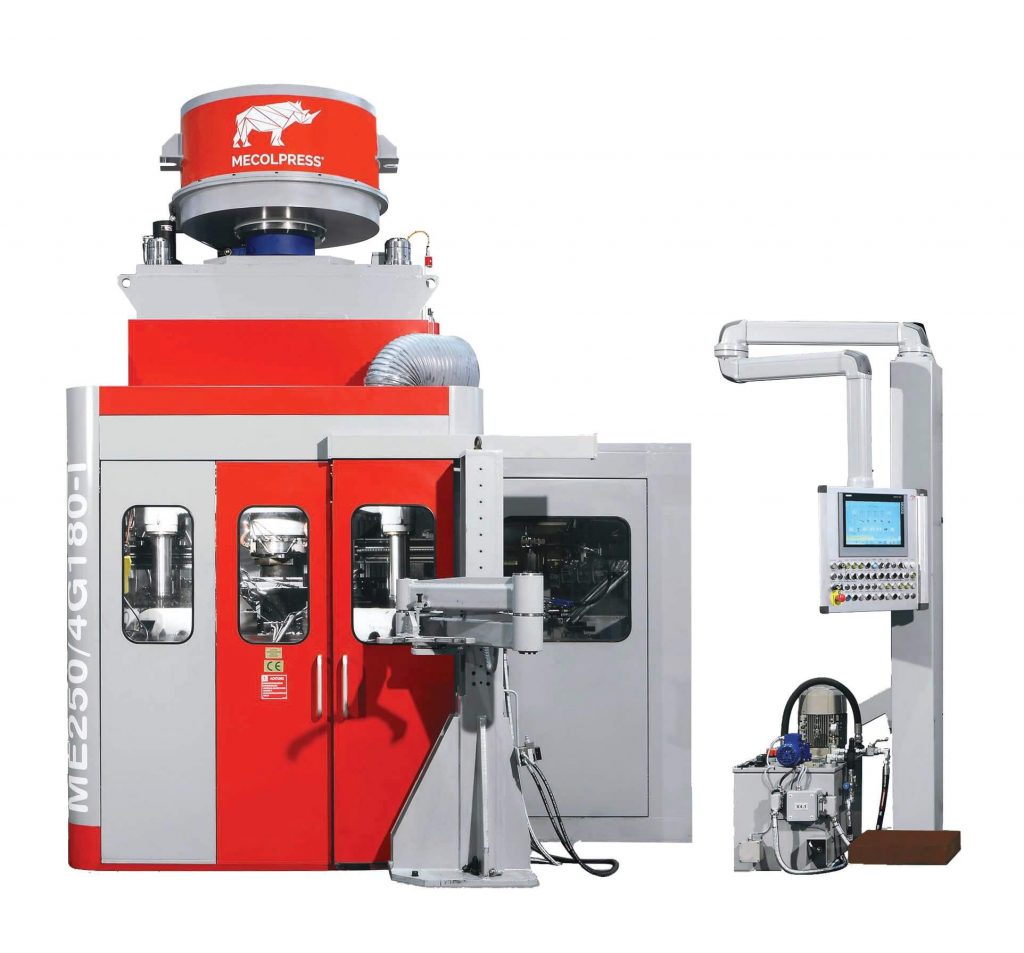
Some practical examples about the choice for a hydraulic press.
- Hydraulic press ME150: this is a quite small machine and often we suggest it to who has no experience in the hot forging field.
- Hydraulic press ME 250: let’s get serious!
Example: are you undecided if you want to buy a 400t mechanical press or a ME250 hydraulic press?
If you have small and easily to force parts to be produced in huge quantities and in series maybe the choice of a mechanical press is the most suitable, but if you have a part that is lightly more complicated, probably you need an hydraulic one. In this case, we are sure that a test here in Mecolpress will remove any doubt!
- Hydraulic press ME from 450tons onwards: This press is more efficient, more cost-effective, it allows to save material, to increase the productivity, it is more convenient, more silent, no foundation pit is required and despite of what our competitors affirm, the energy consumption is not high. In fact, this consideration comes from the fact that just the installed power is taken into consideration.
Did you carry out a forging simulation and forging tests?

In order to choose the right press it is surely helpful to carry out a forging simulation, our technical office can support the customer during the process for choosing the machine with a software analysis of material flow, in order to carry out a sort of “virtual pre-acceptance” of the plant.
Once that the forging simulation is successfully over, then the next step is a real test in our factory. Indeed we have available machines devoted for the forging tests, this is a very important aspect for the customer that often gives him the possibility to invest in a more aware and motivated way. Touching the forged part doesn’t leave no room for doubt!
Being able to satisfy and fully understand the customer needs, to demonstrate and propose our most suitable solutions with concrete tests thanks to the machines and toolings we have available in Mecolpress for the forging tests is for us matter of pride.
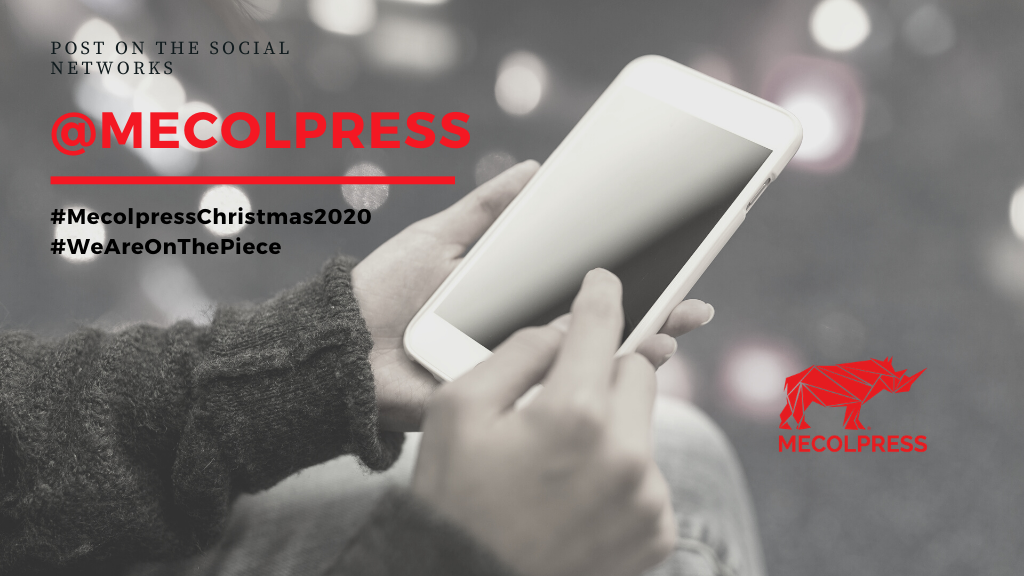
#MECOLPRESSCHRISTMAS2020
Usually in Mecolpress, to celebrate Christmas, we express each other good wishes with two special events: a dine-out evening that allows us to share special moments, stories and anecdotes, and a toast in production on the last day of work accompanied by the speech of our president.
This year obviously it will not be possible to do any of this, so what?!?!
What can we say about 2020 coming to an end?
Certainly the year we are leaving behind is a year that we will remember because of Covid that has not spared any country in the world.
If we are to talk only about the Mecolpress reality, we can now consider ourselves lucky in terms of health. And also from a work point of view the year is ending without major deviations from the previous year even if we had foreseen a very aggressive budget that aimed to different results, we can say that the current situation caused by Covid has not put us in particular difficulties as may have happened for other types of companies or other production sectors.
This year it was not possible to carry out some technical interventions in some countries, all the trade fairs to which we were registered could not take place, and we had to postpone visits to our mainly foreign customers.
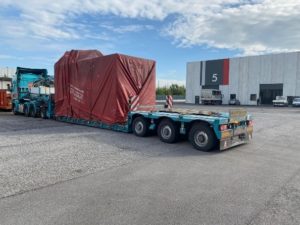
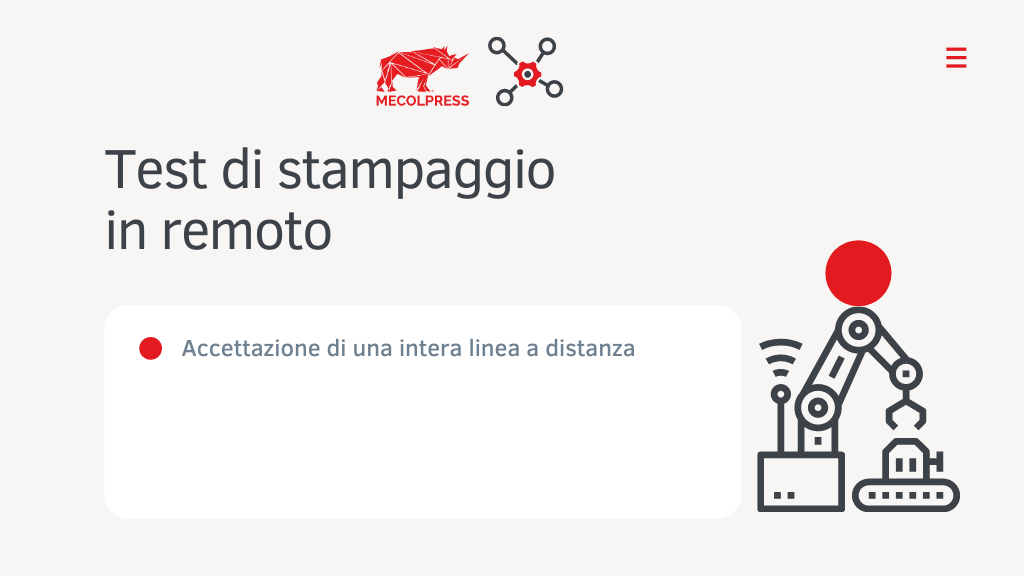
But we’ve all learned to use more digital tools, which allow us to meet remotely.
We have even tested entire forging lines remotely, and more and more customers have chosen to use our calipso software for forging control.
But above all we had the opportunity to verify with pleasure and satisfaction, that our customers from all over the world (some even newly acquired!) have renewed their confidence despite the physical distance.
What interesting news we have implemented internally in 2020?

Speaking instead of the Mecolpress reality inside we can say that we have finished most of the works planned in the new Shed 5, specifically the most interesting thing we implemented was the purchase and starting up of a powerful induction oven. This oven is for our exclusive internal use and allows us to perform forging tests not only for brass and aluminum pieces, but also for steel pieces. Steel in fact needs higher temperatures than other materials. Thanks to the work that our technical engineer specialized in hot steel forging is doing, we are investing a lot in the production of machines for this material.
We realize more and more that for the customer to have the proof, to see the piece to must be forged, concretely made by a machine that we always have available to carry out forging tests, is very important!
Often customers come to us who have to make even complex pieces, with many doubts and perplexities. It is of great satisfaction for us to show them how the Mecolpress press that we recommend to them, after study by our technical office that also uses a forging simulation, can make their piece with higher quality requirements. And it’s that added quid that has often allowed us to make a difference.
What we expect in 2021?
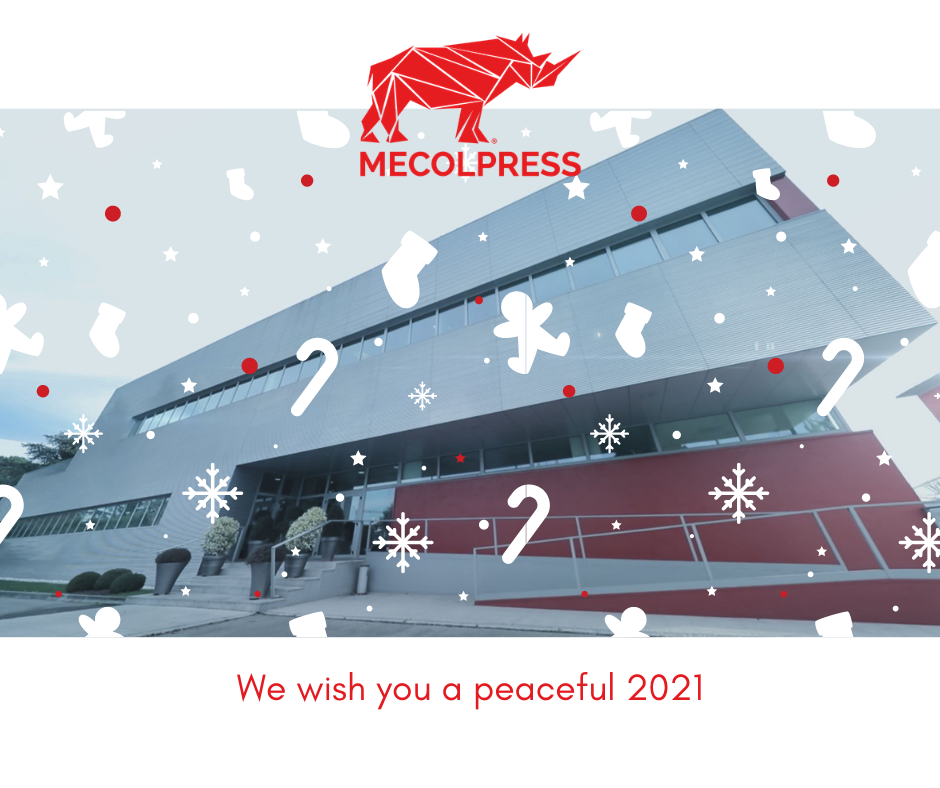
The spread of Covid-19 obviously weighs on any forecast or programming. But we hope to reschedule many businesses that have been postponed in 2020. We are currently investigating global markets to assess how much customers will be able to invest in the coming months.
However, we are full of preparation and positivity, our sales force is working to propose solutions suitable for needs that may be changing.
And above all we are on the piece!
Mecolpress Best Wishes
Since it is not possible to exchange greetings as usual, we just have to do them online, but with our hearts. We sincerely hope you can spend a serene Festivities, this is the wish we address as well to our employees and their families, our customers and collaborators.
Because Mecolpress is made by all of you, of people who work every day, collaborate, give us confidence and make Mecolpress not only a company but a large family.
In this regard we ask you to share with us selfies, a wish, a phrase, or a toast … to share the wishes with us, DISTANT BUT UNITED:
Post your message on the social networks and mention @mecolpress
Insert the hashtag #MecolpressChristmas2020 #WeAreOnThePiece
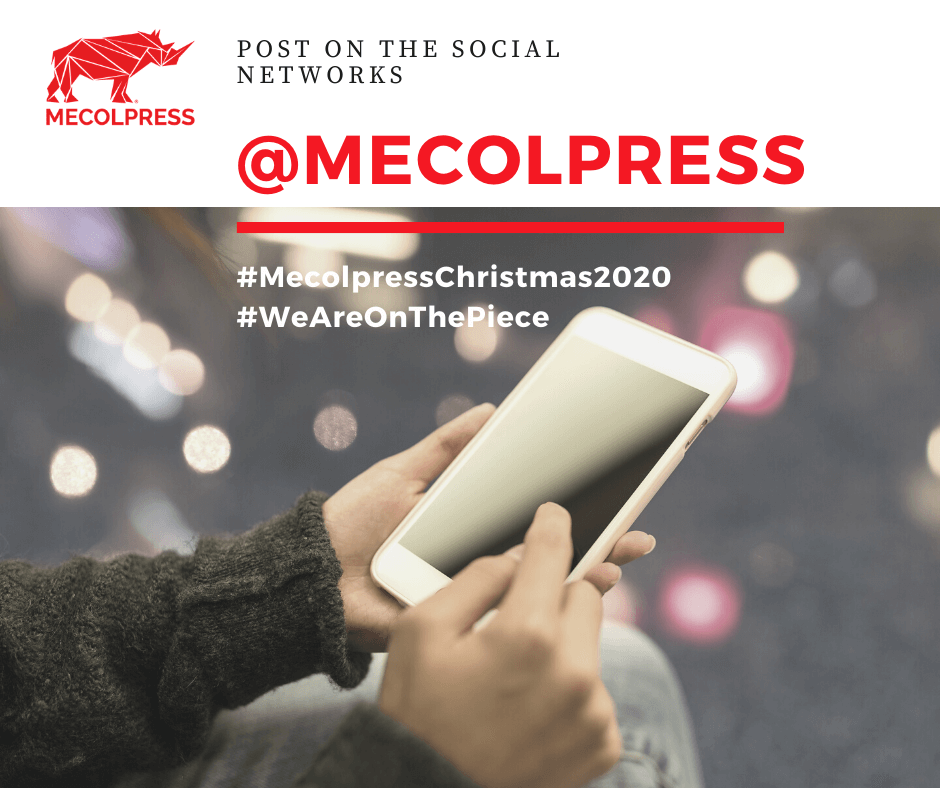
Our social channels:
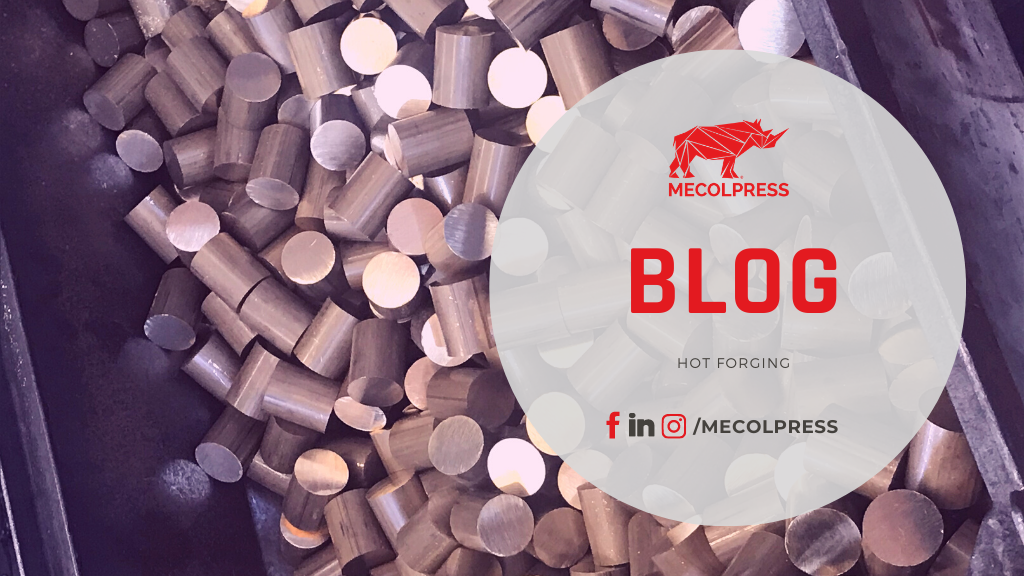
Biography of our hot forging blog
At the beginning of 2017 Mecolpress decided to start a blog entirely devoted to the hot forging world.
We set for it 2 goals:
- Being a reference point for hot forging companies, above all if these are first-time forgers.
- Supporting the companies having a long hot forging experience but that want to optimize their process, to better use their presses and to find answers to the necessities they meet step by step.
We have realized, doing some internet researches that it is very difficult to gather information regarding the hot forging world.
On Google you can find anything, but you will barely find suggestions or detailed deepening on hot forging!
Frequently we happen to be contacted by beginner hot forging companies, or companies having inexpert or not particularly qualified personnel (for example you can read this article) and all of these want to have further information.
We are aware that it is not possible to become expert forgers or to learn a job from Google but it is equally true that in 2020 I have to find answers on the internet to my necessities and some deepening on the topic.
Who are we?
Mecolpress is a company specialized in the production and installation of hot forging presses for brass, aluminum, copper, titanium, steel and other alloys.
Mecolpress was established in 1969, therefore we have a long forging experience and knowledge.
In our production workshop we have persons extremely expert in brass hot forging, and recently we have inserted in our staff also a steel “technologist”, we have available a mechanic and electronic technical office completely internal and a highly appreciated customer-care service.
To date we have developed and installed more than 1.950 presses at more than 400 customers all over the world, used for the forging of brass, aluminum, copper, titanium and steel.
One of the features that our customers usually appreciate most is the after sales service: the great and guaranteed material availability is added to the expertise and solid knowledge of the machines. The efficient feedback of Mecolpress lies in the largeness of the areas dedicated to the storage of parts that can be requested by the customers (we have 2 devoted warehouses) and in the investments decided exactly in favour of the “warehouse”.
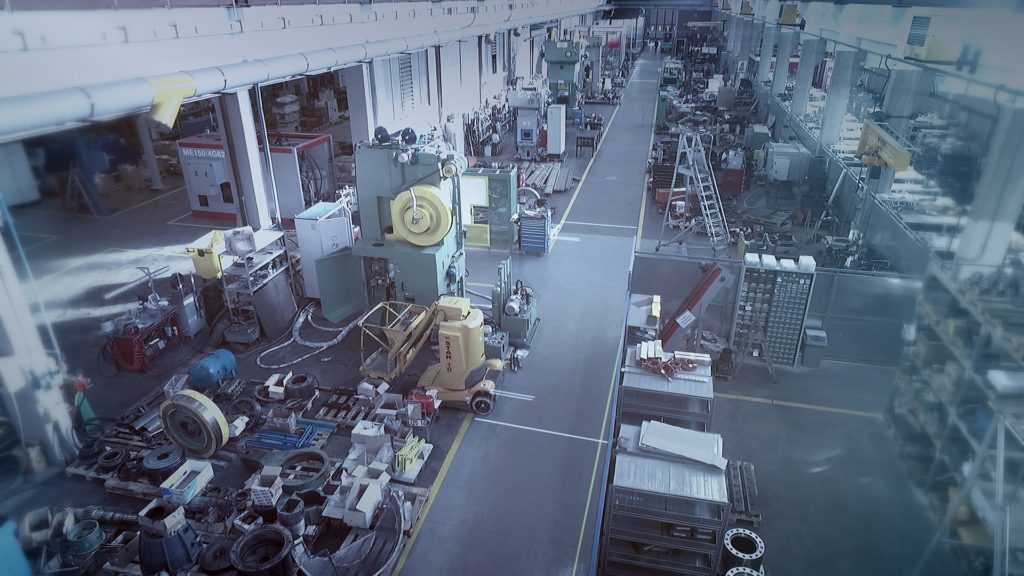
Why writing a blog regarding hot forging?
At this point we said “why not sharing part of our skills online? For example, with a company from South Africa that is wondering if it’s worth it to convert his production in a hot forging system?”
“And in addition, could all the expert forgers (Mecolpress customer or not) be interested to understand if there are improvements to apply to their production? The world has changed and even fields such as the hot forging one may seem as more “static” but, as a matter of fact, they are not. If you don’t stay up to date you will lose important commissions and the quality of your work won’t evolve!
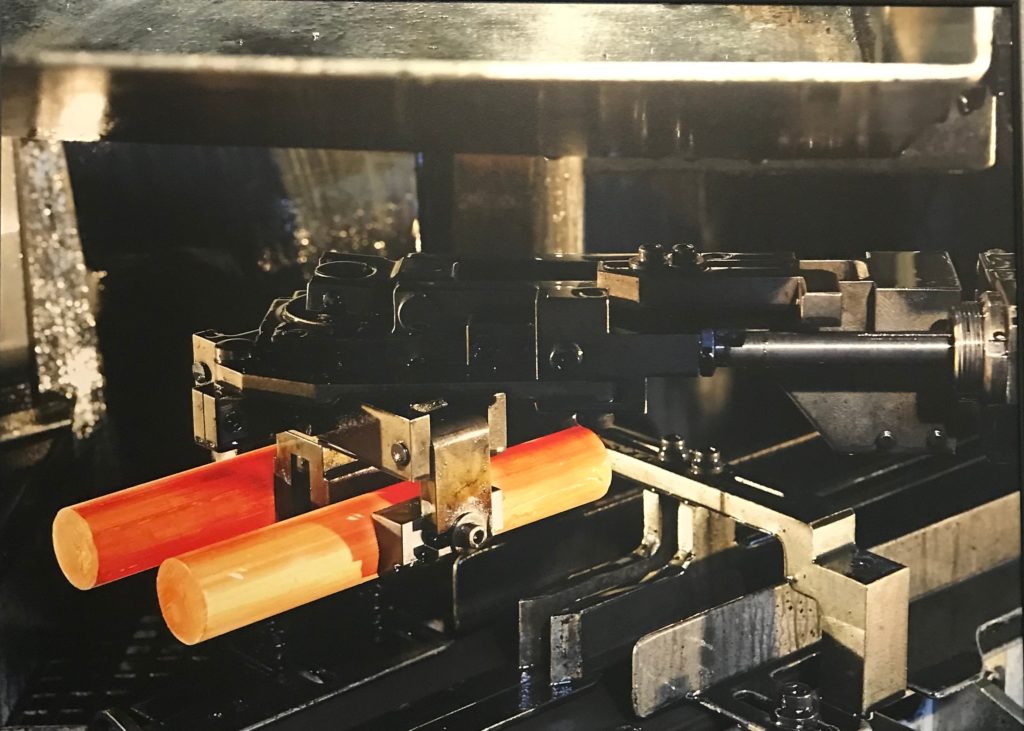
Which kind of answers will you find on this blog?
With our blog we offer ideas and tips to improve each forging process. To manage the machines and the forging lines in the best way in order to obtain the best productivity, more flexibility and less maintenance.
The topics that according to us are easier to speak on are the technical ones, thanks to the experience acquired in 50 years of activity and to our numbers, but we try to maintain a character that can be easily understood also to the less experienced companies, remaining at disposal for further in-depth detailed explanation.
In the “Case Study” category you will find for example:
- How we could help a German customer of ours to win successfully a challenge, to forge a very complex set of parts that he didn’t dare to accept as an order.
- Is it possible to reduce the gate valves costs by forging without flash? It is possible by means of ME hydraulic presses.
- Is your screw press driving you crazy? You could have disregarded what for you is just a detail, but our experience taught us that it can make the difference!
We propose solutions to problems caused by a not optimal usage of the presses or screw presses, by the inexperience; these are requests that we collect from our after-sales department. We give voice to necessities that also for expertised hot forging companies sometime can appear as complex.
A challenge we can win for our customer means for us a great satisfaction!
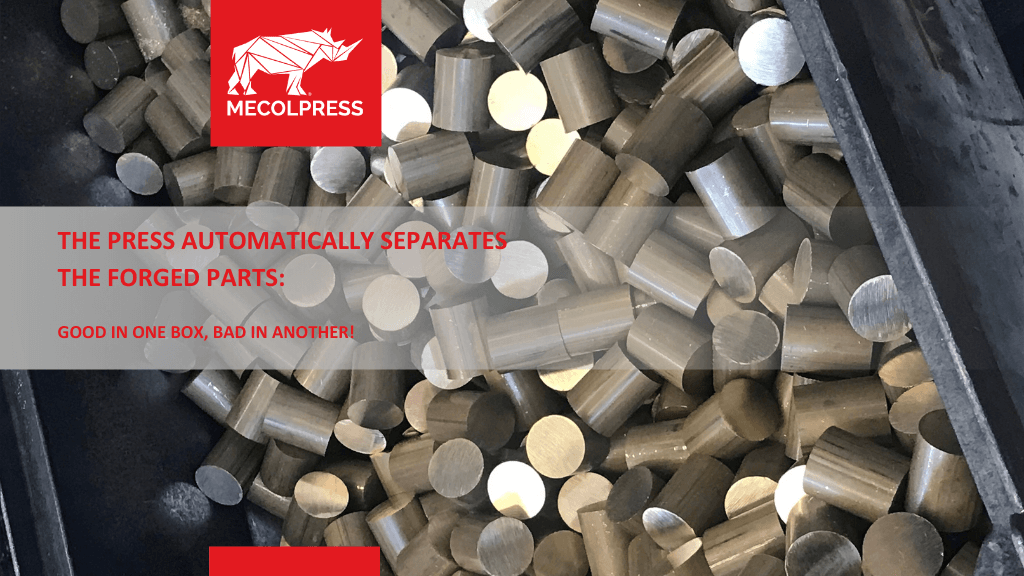
THE PRESS AUTOMATICALLY SEPARATES THE FORGED PARTS: GOOD IN ONE BOX, BAD IN ANOTHER!
Differentiated unloading of the forged pieces
The press automatically separates the forged parts and divide them into different boxes. The press has become intelligent!
The differentiated unloading of the forged parts is an interesting function that Mecolpress provides by default on all hydraulic presses, but it can also be added as an option on eccentric mechanical presses.
Hot forging for higher quality of forged parts
The metal hot forging differs from the cold one because it allows you to obtain high quality pieces through an important deformation of the starting material. By working brass, copper, titanium, steel and aluminium by means of hot forging presses, in fact, it is possible to produce particular shapes, even with complex geometries.
The metal hot forging therefore allows to obtain parts that are more resistant than those obtained through other production processes.
In particular, metal hot forging can increase the strength and resistance of the products. For these reasons, the production of hot forged pieces guarantees specific advantages in their mechanical characteristics compared to those produced with other technologies such as casting or mechanical machining with chip removal.
The hot forging, compared to the casting processes, allows to obtain mechanical characteristics and surface appearance of superior quality. We at Mecolpress know it well, so much that we have made “Technology of Shape” our motto.
The piece produced must therefore be perfect, its quality must be certified. For this reason, Mecolpress has designed a system that allows the press automatically separates the perfect forged parts from those to be evaluated as they may not be such.
Why is it so important that the press separates the perfect forged parts from those to be evaluated?
From the automotive sector, the Lean production method teach us:
- Companies can be competitive on small production batches (producing only what is necessary) instead of manufacturing high quantities at low prices, with the risk of keeping high stock levels, are rewarded with success.
- The second must of the “Lean” work methodology is the zeroing of the waste and dispersions, or in other words, of the useless productions because of defected parts.
One of the most recurring needs in our customers is to have an ever more intense control of the forging process: the machine must be able to control as many parameters as possible important for the forging process, record them to make statistical predictions on the deviation from the optimal production, carry out checks.
Mecolpress offers a series of forging presses that fully meet the needs described above: the ME hydraulic series.
The hydraulic presses can control numerous process parameters and on these manage the logic for rejects or collect the measured values for statistical analysis. For example, they can control:
- the temperature of the billets to be loaded,
- the coring punches penetration time,
- the punches real penetration force,
- the final position reached by each punch.
Here you can learn more about the most important process parameters that hydraulic presses are able to evaluate.
The machines of the ME series have the credentials to be competitive in a modern and controlled forging field; they operate at their best on medium / small batches, thanks to their flexibility.
In this video we show how our hydraulic presses perform the differentiated unloading of the forged parts:
The pieces that do not fully comply with the process parameters set by the operator and analysed by our powerful Calipso software to control the forging process, are unloaded in a separate bin.
For the customer this operation translates into an important saving method:
- Less waste of time,
- Less material / pieces to be discarded,
- Be sure that the forged piece complies with the required characteristics,
- Get perfect shapes.
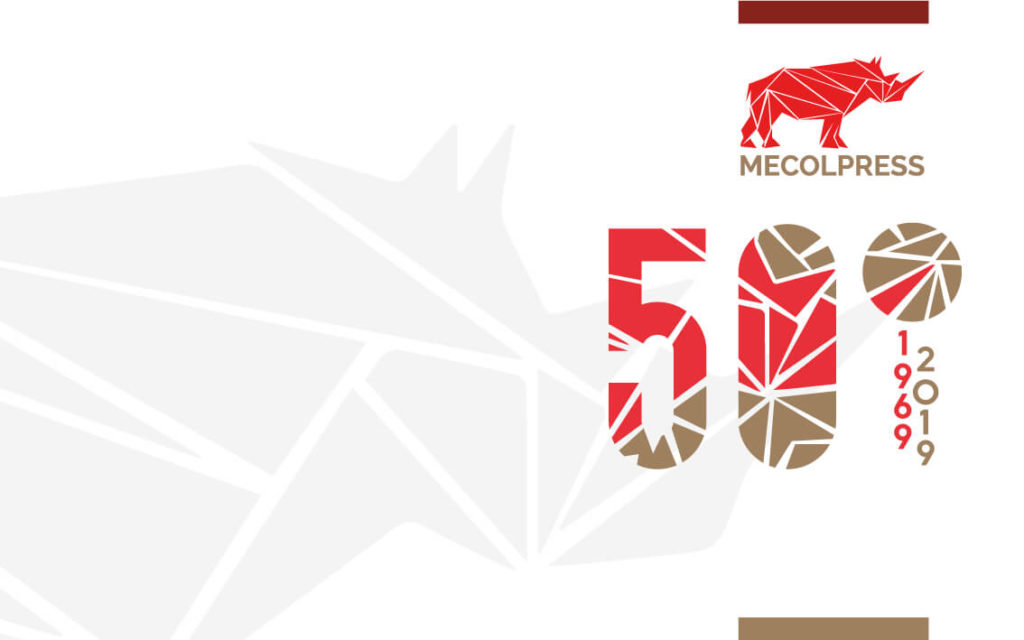
Mecolpress, 50 years in the hot forging sector
This year Mecolpress has reached the goal of its first half century of activity by presenting a new continuous and discontinuous cycle press at EMO exhibition in Hannover, held last September.
In the present of Mecolpress there is also an investment in the world of electric scooters.
The video story by the management of Mecolpress:
Established in 1969 by Giulio Molinari, Giulio Barbisoni and Pietro Caggioli, MECOLPRESS was founded as a manufacturing company of mechanical presses for brass components hot forging. A few years later, in 1973, the company acquired its current production site in Flero, in via Don Maestrini, initially extended over an area of 2,000 square meters, and then it expanded increasingly reaching 6,000 square meters in 1993. Today Mecolpress has acquired a second industrial area next to the first one where the construction of a warehouse is coming to an end, reaching a total area of 30,000 square meters.
In addition to the industrial area expansion, over the years Mecolpress has aimed higher and higher thanks to the acquisition of two important brands of the screw presses production: the Italian company, Dellavia (1993) and the Swiss company, Osterwalder (1998). The company has always distinguished itself as an avant-garde reality in the forging sector: remarkable are the production of the first continuous cycle mechanical press in 1983, the production of the first continuous cycle electronic press in 1993, the design and construction of the hydraulic press for hot forging of brass components without flash in 2008 and the presentation on the market of the screw press with direct drive motor in 2013.
In September of this year, in occasion of EMO exhibition in Hannover, Mecolpress officially presented the new series of continuous and discontinuous cycle eccentric presses, the HEAVY series.
This new machine has an innovative and modern structure, more robust, and designed to simplify the control and maintenance for the operator. The automation and the dies lubrication of the machine was completely renewed, thanks to the addition of a bearing, that allows, among other things, for vibrations reducing and it is provided with a new intelligent software for the production process analysis and for predictive maintenance.
On 31st August, Mecolpress celebrated its first 50 years of activity by opening its doors to the families of the employees who work at the Flero site every day. In this first half century of activity, there have also been moments of sacrifices and difficulties, but the tenacity and determination of its founders allowed Mecolpress to emerge very quickly in a particular market such as the forging one.
The second generation played an important role in the history of the Rhinoceros, as well, in particular, during the economic crisis of 2008, when the company could make courageous decisions, expanding its business, pushing on the accelerator of innovation and research, trying to renew itself and pushing beyond the borders drawn by parents. Now the company has reached the maturity of an important reality that operates all over the world, where the glorious history of its beginnings coexists with the desire to get involved that has especially characterized with research and innovation the last years.
With the background generated by this mix of values, now also the third generation appears in the management panorama.
Watch the video of our Anniversary Party:
Mecolpress, a new adventure
In 2018 Mecolpress acquired the majority of the shares of ME Group, manufacturing company of electric scooters with an unique design, becoming the reference partner alongside the founders. The entry of Mecolpress formally coincided with the passage of ME Group from Innovative Start Up to Innovative SME. This formal transition was in fact also substantial, thanks to the contribution of Mecolpress from a financial point of view and above all from the point of view of know-how and industrial approach to the organisation of the company. ME is the first scooter in the world with a patented frame made of SMC (Sheet Moulding Compound), a compound of thermosetting resins with excellent performances in terms of strength and resistance in relation to its weight. This electric scooter can be recharged like a mobile phone: it can be fully recharged in 3-6 hours (depending on the battery charger used), connecting the scooter directly to a domestic outlet in the garage or office or extracting the battery.
The ME Start Edition version (sold out) was followed by the range available from the 2019 season: 2.5 kW moped model, 45 km/h top speed (limited by law) and 80 km range and 6 kW model with a speed of 80 km/h. Touch display, USB socket and a range of accessories in continuous evolution complete the equipment of ME.
Company numbers:
Mecolpress has grown over the years both in terms of volume of the industrial area and in terms of numbers. Starting from the employment situation: in 1985 Mecolpress had 29 employees, in 2018 it practically doubled its staff to 55 employees. Turnover and production are also growing: in 1985 the company turnover was just over 2.7 million euros. By 1995, turnover rose to 7.5 million euros and then the last available turnover (2018) exceeded 11.3 million euros.
Over the years production has also gone hand in hand with turnover increase. Today Mecolpress has 559 customers in 59 countries worldwide. All over the world there are 1126 Mecolpress machines, including screw presses (101), mechanical presses (806), hydraulic presses (40) and trimming machines (179). Most of them (763) are located in Europe, but the Flero-based company has also exported in Africa (62), Americas (103) and Asia (198).
In addition, Mecolpress is particularly active in after-sales service. The heart and pride of Mecolpress is its large spare parts warehouse, which is able to supply accessories or spare parts for machines produced fifty years ago. For this reason, in addition to the sale of machinery, there is a wide activity related to the service and supply of accessories (such as tools, arms, spare parts, etc..) in the order of more than 1,000 units, bringing the total production of machinery and spare parts to 2183 pieces.
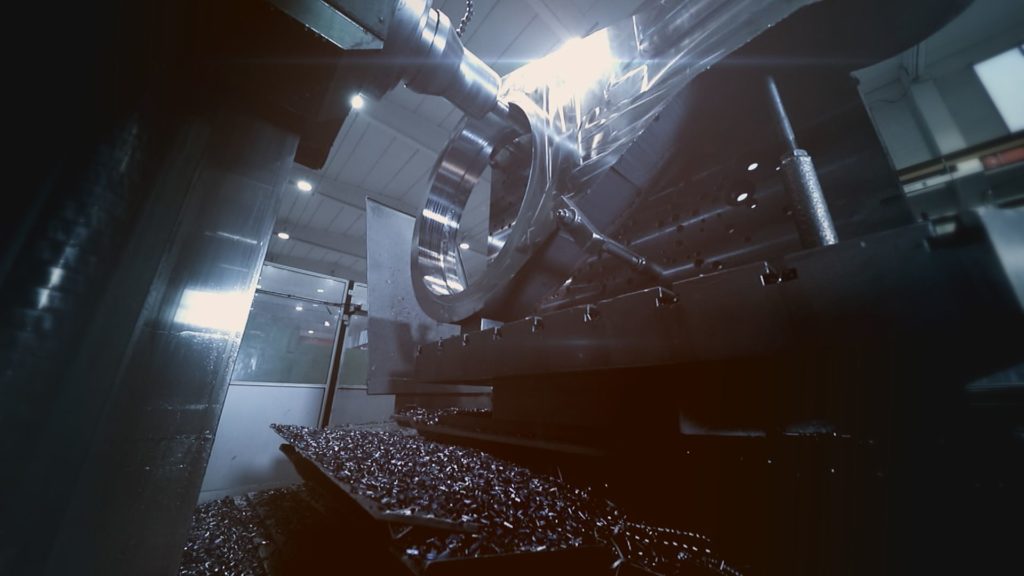
Metals hot forging process
Metals forging: hot or cold forging?
The forging by means of presses of metals commonly used for the industrial production, such as aluminum and brass, can happen in two ways.
- The first one is the cold coining, carried out, for example, on a piece that already has its own shape and that is forged through the press in such a way to calibrate it and to compact it. The cold coining is suitable, above all, for small size parts and for great production batches, such as screws. The most suitable machines for this type of process are our screw presses.
- The metals hot forging is different from the cold one because it allows to obtain high quality pieces by means of an important deformation of the starting material. With the deformation of brass, copper, aluminum by means of hot forging presses it is possible, indeed, to produce particular shapes, having very complicated structures as well. In order to achieve this forging, Mecolpress proposes, beyond the already mentioned screw presses, also the mechanical and hydraulic presses according to the different production necessities expressed by the customer.
Mechanical and hydraulic presses for the hot forging
The mechanical press can hot forge even complicated pieces. At the end of the process, the forged parts can often have some remaining flash that can be eliminated by means of a trimming machine, machinery that is part of the products range that we offer. The eccentric mechanical press with continuous cycle is recommended for the customers who have high production necessities, while the hydraulic press is more advisable for parts having very complicated shapes and that would require, otherwise, the usage of a lot of material. This type of press permits, indeed, a saving of the input material, so offering to the forger a good margin on the product cost. Moreover, by forging the parts by means of hydraulic hot forging presses, at the end of the productive cycle the parts range that can be produced without flash is much wider, thanks to a progressive and programmable application of the forces. Another characteristic of this type of presses is the flexibility, given by the wide number of available functions.
Hot forging line
For the metals forging a furnace that can be electric (induction) or gas furnace and a press are needed. This is the base productive line for the aluminum, brass, titanium and steel processing; line that can be upstream completed with a sawing machine that cuts the metal bar in billets and with a graphitizing machine, where the billets are treated with the graphite before these are inserted in the furnace, so that these absorb better the heat and that are kept lubricated. The graphitizing, that offers remarkable advantages from a productive point of view, such as a minor gas consumption in the furnace and a superior durability of the dies, is just fitting for some specific production typologies. It is not recommended, for example, for the production of parts that once forged, must be chrome plated or exposed to further particular treatments. Our sales department is at the disposal of our customers for suggesting the best forging line composition according to the product and to application field.
Hot forged metals
The customer’s choice for a specific press for his own productive cycle is based on the material typology used by the forger and on the shapes to achieve.
For the brass forging the hydraulic press is more fitting than the screw press, that is better for the forging of titanium and steel. The eccentric mechanical presses are used for all the metals, even for the copper hot forging. Our sales department is at disposal of our customers for offering the best technical solution for every specific productive situation.
For further information about hot forging machineries, please write us at sales@mecolpress.com
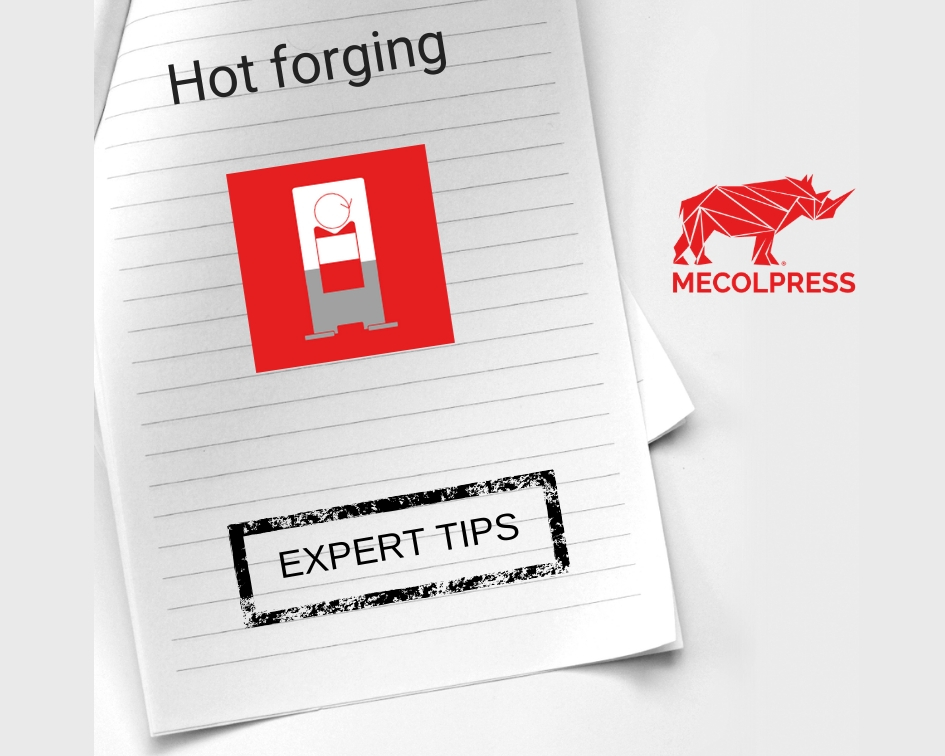
Interviews in the company: Riccardo Segreto
At Mecolpress offices we met Mr. Riccardo Segreto, person in charge of dies test and brass forging department.
What is your role in the company?
I follow the dies design for the parts forging both in brass and aluminum. Then I follow the starting test for the set-up of the die with all the necessary procedures to prepare it, to make it work properly, also suggesting the proper maintenance.
From which sector do you come from?
I have 25 years of experience in the forging sector, during which I mainly took care of brass hot forging process.
So, we are mostly speaking about brass. There are different types…
Indeed, the brass is an alloy that can be combined in many different types. Recently the tendency to produce it without lead is affirming. In this Italy follows Germany, where Ecobrass is used for a few years now, that indeed is without lead. Since the brass produced parts are largely directed to the domestic water circuits and installation, it is clear that the presence of lead represents a danger.
In the sector of taps and fittings, components, the same norms forbid the lead usage.
This is good for our health but taking off the lead from the brass alloy means to reduce its processability and this reflects on the machines, because the traditional ones are no more adequate, for example due to high cycle times or uncontrollable vibrations during the working phase.
Critical issues that arrive then to the machines. What is the answer from Mecolpress?
The company philosophy is focused on the absolute quality. Translated into concrete terms, regarding brass it means to be able to forge without flash. In this case, our hydraulic presses are very efficient. These are machines that guarantee a drastic reduction of wastes and an optimum quality of parts.
Do you speak about all parts, without differences?
Yes, the range of productions is very wide, from the ball valves to the T junctions, from components for gas plants to automotive parts. The choice is complete.
Which features contribute to the good functioning of the machine?
Reaffirming that when there is no flash some problems can be considered as to be solved, I would mention the simulation program that is a valid help for the forging of very particular parts. It is a software that, once the parametrization is given by the Mecolpress designers, shows the material flow inside the die, allowing to prevent deformation flaws in the points of impact or the brusque alterations of temperature that generate criticalities in the parts. Even if it does not replace the sensitivity of an artisan, and his experience can indicate reliably the points that need adjustments and corrections. And it allows – this is the advantage – to intervene in time.
The message of Mecolpress is above all a call to quality. How do the customers react?
Many operators of our sector are at this point convinced that our advantage incentive is the quality. They understand that to stay active on the international market, they need to be protected, and not to give up with the features for which the Italian companies are always very appreciated worldwide. It is not convenient to lose time in the battles on new orders fighting on few euros, according to us it is always better to offer a 100% quality standard. This is the distinctive characteristic of our presses and the factor that brings more satisfactions.
I mention gladly the last one: we are working hard on a test of 100.000 parts (brass sanitary taps and fittings), commissioned by a German producer that turned to us after he asked to competitors. They request to forge 100.000 parts without flash and without changing the die: we took up the challenge, but we are sure that we will win the challenge.
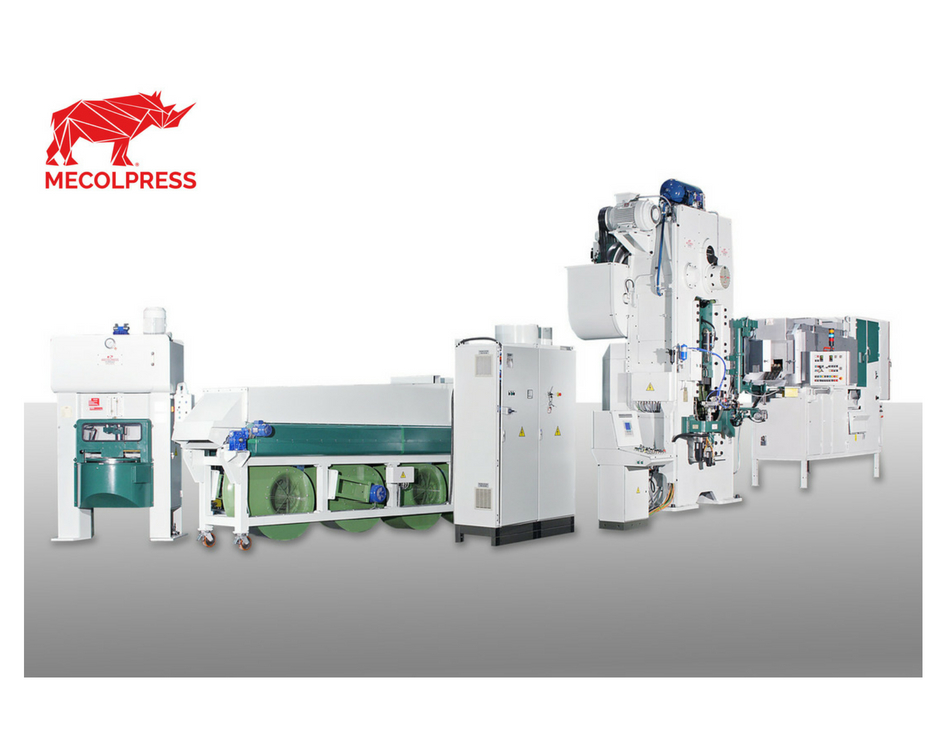
Beyond the press: great care for all the manufacturing segments
The reasons why you should appreciate (and prefer…) the modularity
In the planning and realization of different forging lines there is a common denominator, and it is the main machine, the heart of the entire project: the press.
Even if it concerns aluminum or brass forging, the press manufacturer must have a broad view, that can contemplate the entire process, from raw material bars to the finished part. An optimum press has to be born “conceived” in such a way that allows it to be able to work in synergy with the other components of the line, in order to guarantee to the user the maximum efficiency and minimum wastefulness.
The most important manufacturer’s feature that every customer who buys machineries looks for is reliability: the certainty of providing themselves with a product that “performs”, that gives satisfactions and no worries. Obviously, the moment of the initial choice of the machine is crucial, and it is determined by understanding the variety and variability of customer’s necessities over time and by the manufacturer’s competence satisfying them.
And then, steps that cannot be considered “less” crucial will arrive: installation and activation of the machine, for example. These are moments you will spend calmly, if you have someone by your side that assumes wholly the responsibility to have delivered the machine, to have verified that it works during the entire working life of the machine, as expected by the costumer, since the manufacturer is present from the start up.
Putting effort into guaranteeing all this means to be completely “master” of their own technology and of all the components that compose the line, thought as many different “segments” of a whole. We all know that presses for working and going into production need accessories, like sawing machine, furnace, deburring machine…
The skilled press manufacturer knows how to give the right relevance to these segments, by addressing the customer to the most appropriate choice (both for technical characteristics and budget characteristics) for him, by offering the most correct solutions, even if these are supplied by the manufacturer himself or if these are reachable directly from the customer by other specialized manufacturers.
The habit to think and to study every single “segment” of the forging line so that it contributes to the best, in its peculiarity, to the line efficiency has a name: modularity. The numerous satisfaction “stories” of the “Top performer” customers indicate the modularity as the most efficient way to go.
How many elements, realistically, is the press connected to? The list is long:
- traditional gas heating furnaces,
- Induction heating furnaces,
- graphitizing machines,
- arms or external Robots and of third party for loading/unloading of the machine,
- trimming presses,
- sandblasting machines,…
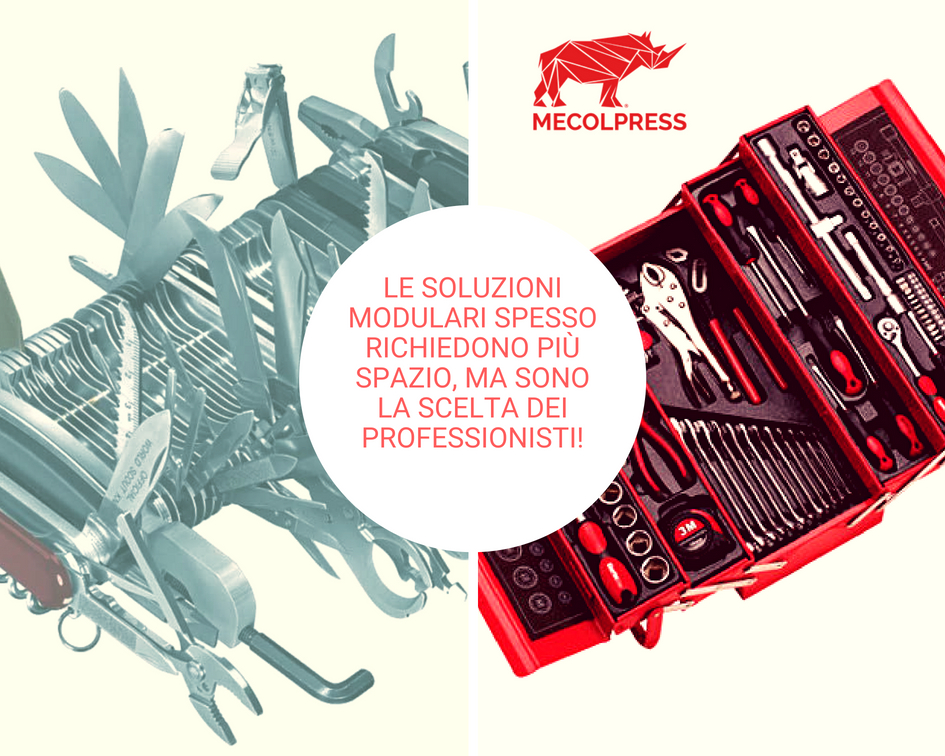
In the face of a so articulate system, the experience shows us that the “compactness” is not enough.
There is no doubt that setting up a line according to the modularity criterion will request:
- Time and patience;
- active consultation of the manufacturer;
- the need of being informed and updated on the market proposals
- Once the choices are made and components are purchased, arranging the suitable places to place them.
But let’s resume exactly from here. The possibility to “save” spaces, indeed one of the main subjects of the offers of compact lines manufacturers, seems not to be a small advantage.
However, combining many specific machines in just a “compact” solution for the above-mentioned advantage to save space risks to compromise the production results. Unfortunately, the matter of fact is that a break of just one component is enough to stop the entire “compact line” activity. So, the risk is: I have optimized the space, but the banal breakdown, for example of a blade of the shearing machine could cause the stop of the total production. At that point, having saved space will not be a great consolation, unfortunately.
The style of modularity belongs traditionally to manufacturers who knows thoroughly the problems and matters that who forges must face every day. Who has this kind of knowledge also knows well that the fact of being able to intervene in a focused and independent way on every components of the line has no price.
The modular concept, that as we have already seen, provides to have the press in line but separated from the furnace and even not in line with the other machines (as, for example, the sawing-machine or the graphitizing machine, that working separately, can create “buffer” stock of semifinished parts along the line), it allows:
▲ The biggest flexibility: the customer can choose the components he prefers (gas or induction furnace, sawing machine or seaming machine…), changing them in the future to answer to new needs, and to adapt the line layout to a company that develops.
▲ The press, since it is independent from furnaces and sawing machine, can be used in the future for forging other types of brass alloy, or copper or aluminum.
If sawing-machine, furnaces and press are “melt” in just one machine, this is not possible.
▲ Every machine can give its best (a good sawing machine can cut more billets/hour than a press can print) and does not have to adapt to the speed of the slowest machine.
▲ The line will be able to be easily adapted to non cylindrical classic billets, but also, for example pre-bent, disc shaped, billets with special contour.
▲ The best efficiency: each machine is independent, the press can forge when the sawing-machine needs a blades replacement: on the contrary, when the die on the press is replaced, the sawing machine can continue to prepare billets.
A solid knowledge of the machineries is the fundamental base that allows the manufacturer to design and propose the best technical and economical solution for the customer’s needs. Since the manufacturer is specialized in the production of presses and since he is not obliged to provide with the press its own sawing/shearing machine and furnaces and not those of anybody else, will be able to suggest to the customer the best solutions to the specified needs.
The range of the proposal is very wide, and it is possible to range from new lines (in which each component is totally new and realized by the best specific manufacturer) to lines in which one or more parts are overhauled. But is welcomed also the costumer that, choosen the press manufacturer for trust and reliability reasons, then refers to him to have consultation and indications for the other components to add so to have a complete line, “ad hoc” both for the technical production requirements and for the “wallet” ones.
Regardless of your belonging sector: thermal-hydraulic, gas, automotive, railway, biomedical, special screws, clothing components, the modularity confirms always to be the winner, exactly for the flexibility that guarantees to the forging line and for maintaining its efficiency.

